| ◄ DECEMBER ► | ||||||
|---|---|---|---|---|---|---|
| ◄ 1950 ► | ||||||
| 1 | 2 | |||||
| 3 | 4 | 5 | 6 | 7 | 8 | 9 |
| 10 | 11 | 12 | 13 | 14 | 15 | 16 |
| 17 | 18 | 19 | 20 | 21 | 22 | 23 |
| 24 | 25 | 26 | 27 | 28 | 29 | 30 |
| 31 | ||||||
| President: | Harry S Truman (D) | |||
| Vice-President: | Alben W. Barkley (D) | |||
| House: | 261 (D) | 166 (R) | 2 (Other) | 6 (Vacant) |
| Southern states: | 102 (D) | 2 (R) | 1 (Vacant) | |
| Senate: | 53 (D) | 43 (R) | ||
| Southern states: | 22 (D) | |||
| GDP growth: | 10.6% | (Annual) | ||
| 1.4% | (Quarterly) | |||
| Inflation: | 5.9% | |||
| Unemployment: | 4.3% | |||
| US killed in action, | 735 | (This month) | ||
| Korean conflict: | 15,383 | (Since Jun 28, 1950) | ||
▲Friday, December 1
![]() Dec 1: Truman asks Congress for $18 billion for arms buildup. President Truman asks Congress for an additional $18 billion ($110 billion today) for a military buildup, including the development and production of additional nuclear weapons. One billion (about $11 billion today) of that goes to the Atomic Energy Commission’s planned Savannah River project that was announced earlier this week. Truman warns that Chinese aggression is, in effect, an act of war against the fifty-three members of the United Nations that are currently supporting the fight on behalf of South Korea. “The leaders of Communist imperialism could not help but know that this action involved grave risk of world war,” he says. Republicans and Democrats alike appear ready to provide the money as fast as the legislation process can work. Already, preliminary committee meetings are held within two hours of the President’s request. In related action, Truman signs an executive order establishing the Federal Civil Defense Administration. Its predecessor, the Office of Civilian Defense, had been disbanded in 1945.
Dec 1: Truman asks Congress for $18 billion for arms buildup. President Truman asks Congress for an additional $18 billion ($110 billion today) for a military buildup, including the development and production of additional nuclear weapons. One billion (about $11 billion today) of that goes to the Atomic Energy Commission’s planned Savannah River project that was announced earlier this week. Truman warns that Chinese aggression is, in effect, an act of war against the fifty-three members of the United Nations that are currently supporting the fight on behalf of South Korea. “The leaders of Communist imperialism could not help but know that this action involved grave risk of world war,” he says. Republicans and Democrats alike appear ready to provide the money as fast as the legislation process can work. Already, preliminary committee meetings are held within two hours of the President’s request. In related action, Truman signs an executive order establishing the Federal Civil Defense Administration. Its predecessor, the Office of Civilian Defense, had been disbanded in 1945.
![]()
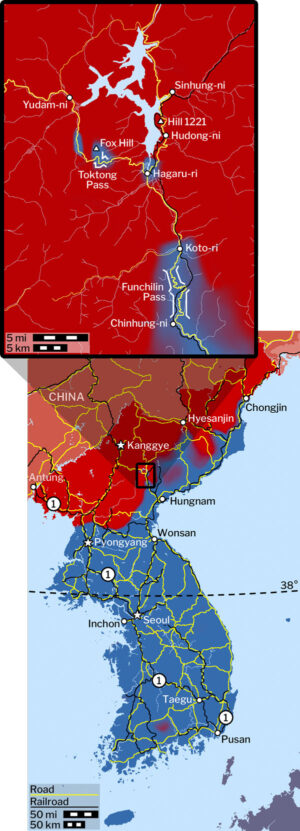 Dec 1: Korean War, Chosin Reservoir: Task Force Faith is destroyed. The remnants of the task force headed by Col. Don Faith, located south of Sinhung-ni, begin their perilous trek back to Hagaru-ri at about 1:00 p.m. shortly after receiving orders to withdraw. But because protecting forces have already been withdrawn from Hudong-ni back to Hagaru-ri, Task Force Faith is essentially abandoned and left to fight its way back on its own. The task force comes under fire almost from the minute it starts out. By mid-afternoon, the it gets halfway to Hudong-ni where a blown bridge slows their progress. Some of his troops become disillusioned and walk westward to the reservoir and walk south over the ice toward Hagaru-ri. The rest of the column continues south as the road goes around Hill 1221, where the task force’s lead forces successfully dislodges a Chinese blocking force. But some troops, believing that the Chinese have closed in behind them, peel off and descend the mountain’s western slopes to the reservoir and move south on the ice. Faith is seriously wounded in an attack just beyond the hairpin curve at Hill 1221 and is put in a truck carrying other wounded soldiers. Through the rest of the afternoon, more men peel off and make a run for the reservoir to head south over the ice. The remainder of the task force, now down to about 100 men, makes the difficult decision to abandon the wounded in the hopes that they can be rescued later. They approach Hudong-ni at 9:00 p.m., where Chinese troops in the village disperse what is left of the task force. By midnight, only the dead and seriously wounded remain at Hudong-ni. Among the dead is Col. Faith, who died of his wounds in the cab of a 2½ ton truck. Survivors will stagger into Hagaru-ri for the next three days, almost all of them coming off of the frozen reservoir. The Chinese at Hodong-ni render aid to some of the wounded and release them. Altogether, a little more than 1,000 of the task force’s 2,500 troops eventually get back to Hagaru-ri, but only 385 of the survivors — just 15% — are able-bodied.
Dec 1: Korean War, Chosin Reservoir: Task Force Faith is destroyed. The remnants of the task force headed by Col. Don Faith, located south of Sinhung-ni, begin their perilous trek back to Hagaru-ri at about 1:00 p.m. shortly after receiving orders to withdraw. But because protecting forces have already been withdrawn from Hudong-ni back to Hagaru-ri, Task Force Faith is essentially abandoned and left to fight its way back on its own. The task force comes under fire almost from the minute it starts out. By mid-afternoon, the it gets halfway to Hudong-ni where a blown bridge slows their progress. Some of his troops become disillusioned and walk westward to the reservoir and walk south over the ice toward Hagaru-ri. The rest of the column continues south as the road goes around Hill 1221, where the task force’s lead forces successfully dislodges a Chinese blocking force. But some troops, believing that the Chinese have closed in behind them, peel off and descend the mountain’s western slopes to the reservoir and move south on the ice. Faith is seriously wounded in an attack just beyond the hairpin curve at Hill 1221 and is put in a truck carrying other wounded soldiers. Through the rest of the afternoon, more men peel off and make a run for the reservoir to head south over the ice. The remainder of the task force, now down to about 100 men, makes the difficult decision to abandon the wounded in the hopes that they can be rescued later. They approach Hudong-ni at 9:00 p.m., where Chinese troops in the village disperse what is left of the task force. By midnight, only the dead and seriously wounded remain at Hudong-ni. Among the dead is Col. Faith, who died of his wounds in the cab of a 2½ ton truck. Survivors will stagger into Hagaru-ri for the next three days, almost all of them coming off of the frozen reservoir. The Chinese at Hodong-ni render aid to some of the wounded and release them. Altogether, a little more than 1,000 of the task force’s 2,500 troops eventually get back to Hagaru-ri, but only 385 of the survivors — just 15% — are able-bodied.
![]() Dec 1: Korean War, Chosin Reservoir: Marines begin withdrawal from Yudam-ni. When the Marines at Yudam-ni receive their orders to withdraw back to Hagaru-ri, they had already reassembled on the south side of the Chosin (Changjin) Reservoir inlet in preparation for rescuing the stranded Marine unit at Fox Hill. They move out at 9:00 a.m, and by 7:30 that evening, they are four miles (6 km) below Yudam-ni. An hour and a half later, a battalion begins its trek through the mountains toward Fox Hill and Toktong Pass. The rugged terrain and -16°F (-27°C) exhausts the men, but they manage to reach Fox Hill and secure the heights overlooking the Toktong Pass the following morning. But it will take the Marines on the road an extra day of heavy fighting for the rest of the Marines to reach the pass.
Dec 1: Korean War, Chosin Reservoir: Marines begin withdrawal from Yudam-ni. When the Marines at Yudam-ni receive their orders to withdraw back to Hagaru-ri, they had already reassembled on the south side of the Chosin (Changjin) Reservoir inlet in preparation for rescuing the stranded Marine unit at Fox Hill. They move out at 9:00 a.m, and by 7:30 that evening, they are four miles (6 km) below Yudam-ni. An hour and a half later, a battalion begins its trek through the mountains toward Fox Hill and Toktong Pass. The rugged terrain and -16°F (-27°C) exhausts the men, but they manage to reach Fox Hill and secure the heights overlooking the Toktong Pass the following morning. But it will take the Marines on the road an extra day of heavy fighting for the rest of the Marines to reach the pass.
![]() Dec 1: MacArthur laments inability to bomb targets in China. Gen. Douglas MacArthur, commander of U.S. and U.N. forces in Korea, publicly complains that orders forbidding him from bombing targets across the Korean border in China represent “an enormous handicap, without precedent in military history.” He says the Communists’ “sanctuary of neutrality behind the battle area, gives them a great advantage because their supply lines are protected from air attack and “they can move troops forward under cover of darkness and rugged terrain.” A reporter asks MacArthur if he thinks the use of nuclear weapons is warranted. MacArthur responds, “My comment would be inappropriate at this time.” He also issues a separate statement denouncing “irresponsible comments appearing in responsible sections of the European press” that are critical of the war. “I can only attribute this to a somewhat selfish though most short-sighted viewpoint.”
Dec 1: MacArthur laments inability to bomb targets in China. Gen. Douglas MacArthur, commander of U.S. and U.N. forces in Korea, publicly complains that orders forbidding him from bombing targets across the Korean border in China represent “an enormous handicap, without precedent in military history.” He says the Communists’ “sanctuary of neutrality behind the battle area, gives them a great advantage because their supply lines are protected from air attack and “they can move troops forward under cover of darkness and rugged terrain.” A reporter asks MacArthur if he thinks the use of nuclear weapons is warranted. MacArthur responds, “My comment would be inappropriate at this time.” He also issues a separate statement denouncing “irresponsible comments appearing in responsible sections of the European press” that are critical of the war. “I can only attribute this to a somewhat selfish though most short-sighted viewpoint.”
▲Saturday, December 2
![]() Dec 2: MacArthur says “undeclared war” exists between U.S. and China. Gen. Douglas MacArthur issues a special statement from his headquarters in Tokyo: “A state of undeclared war between the Chinese Communists and the United States forces now exists.” He says that with China’s entry in the war, the enemy “overwhelmingly outnumbers our forces” and is “thoroughly equipped with modern and efficient weapons.” He estimates that the Chinese Communist forces now engaged in North Korea “comprise approximately 500,000 men divided into two great echelons.” The remnants of the North Korean forces, he says, stands at about 100,000. The combined forces, based on the intelligence estimates, stands at 600,000, which he says “far outnumbers” those of the U.N. Command, although he declines to say how many U.N. troops there are. Reporters aren’t far off in guessing that the figure is something a little over 100,000, which means that the enemy outnumbers the combined U.N. forces by more than five-to-one. He denies that he or his command has ever exceeded its authority, but “has acted in complete harmony and coordination with higher authorities.” He denies recommending or seeking authority to bomb targets in China or to use the atomic bomb.
Dec 2: MacArthur says “undeclared war” exists between U.S. and China. Gen. Douglas MacArthur issues a special statement from his headquarters in Tokyo: “A state of undeclared war between the Chinese Communists and the United States forces now exists.” He says that with China’s entry in the war, the enemy “overwhelmingly outnumbers our forces” and is “thoroughly equipped with modern and efficient weapons.” He estimates that the Chinese Communist forces now engaged in North Korea “comprise approximately 500,000 men divided into two great echelons.” The remnants of the North Korean forces, he says, stands at about 100,000. The combined forces, based on the intelligence estimates, stands at 600,000, which he says “far outnumbers” those of the U.N. Command, although he declines to say how many U.N. troops there are. Reporters aren’t far off in guessing that the figure is something a little over 100,000, which means that the enemy outnumbers the combined U.N. forces by more than five-to-one. He denies that he or his command has ever exceeded its authority, but “has acted in complete harmony and coordination with higher authorities.” He denies recommending or seeking authority to bomb targets in China or to use the atomic bomb.
▲Sunday, December 3
![]()
 Dec 3: Korean War, Chosin Reservoir: Retreating Marines rescue stranded battalion at Fox Hill. Marines retreating from Yudam-ni to Hagaru-ri reach the Toktong Pass, which one Marine battalion secured the day before. They rescue a battalion that had been trapped on Fox Hill since November 28 when a massive Chinese attack shredded U.S. positions all around the reservoir. The columns then continue on to Hagaru-ri. Thanks to heavy air support, they are able to continue with little opposition. Lead elements will reach the Hagaru-ri perimeter later that evening, and the rest of the force will arrive the next day. The bring out 1,500 casualties with them. One-third of the casualties are from cold and frostbite.
Dec 3: Korean War, Chosin Reservoir: Retreating Marines rescue stranded battalion at Fox Hill. Marines retreating from Yudam-ni to Hagaru-ri reach the Toktong Pass, which one Marine battalion secured the day before. They rescue a battalion that had been trapped on Fox Hill since November 28 when a massive Chinese attack shredded U.S. positions all around the reservoir. The columns then continue on to Hagaru-ri. Thanks to heavy air support, they are able to continue with little opposition. Lead elements will reach the Hagaru-ri perimeter later that evening, and the rest of the force will arrive the next day. The bring out 1,500 casualties with them. One-third of the casualties are from cold and frostbite.
![]() Dec 3: Korean War: Evacuation of Wonsan begins. With MacArthur’s orders to concentrate U.N. forces in northeastern Korea at Hungnam, the 3rd Division task force and Marine shore party at Wonsan begins evacuating the port of Wonsan. Most of the forces at Wonsan will be evacuated south by sea to help shore up defenses along the 38th Parallel.
Dec 3: Korean War: Evacuation of Wonsan begins. With MacArthur’s orders to concentrate U.N. forces in northeastern Korea at Hungnam, the 3rd Division task force and Marine shore party at Wonsan begins evacuating the port of Wonsan. Most of the forces at Wonsan will be evacuated south by sea to help shore up defenses along the 38th Parallel.
![]() Dec 3: Korean War, West Coast: U.N. forces withdraw north of Pyongyang. Because the latest intelligence estimates show that the combined forces of the South Korea, the United States, and other U.N. troops are badly outnumbered by the combined Chinese and North Korean armies by more than five to one, there is serious question as to whether or how long the U.S. Eighth Army can remain on the Korean Peninsula. Gen. Douglas MacArthur, Supreme Commander of the U.N. forces in Korea has already issued instructions for a general withdrawal of X Corps in northeast Korea back to the port of Hamhung. Now, Lt. Gen. Walton Walker, Commander of the Eighth Army, begins a series of withdrawals on the west coast to prevent Communist forces from sweeping westward from Songchon to Pyongyang and cutting off the supply and escape routes to the Eighth Army on the Sukchon-Sunchon-Sinchang-ni line. Walker orders the U.N. forces to retreat south about ten miles (16 km) to bring them even with the Communist forces lined up at Songchon. They plan to keep moving south and evacuate Pyongyang over the next two days.
Dec 3: Korean War, West Coast: U.N. forces withdraw north of Pyongyang. Because the latest intelligence estimates show that the combined forces of the South Korea, the United States, and other U.N. troops are badly outnumbered by the combined Chinese and North Korean armies by more than five to one, there is serious question as to whether or how long the U.S. Eighth Army can remain on the Korean Peninsula. Gen. Douglas MacArthur, Supreme Commander of the U.N. forces in Korea has already issued instructions for a general withdrawal of X Corps in northeast Korea back to the port of Hamhung. Now, Lt. Gen. Walton Walker, Commander of the Eighth Army, begins a series of withdrawals on the west coast to prevent Communist forces from sweeping westward from Songchon to Pyongyang and cutting off the supply and escape routes to the Eighth Army on the Sukchon-Sunchon-Sinchang-ni line. Walker orders the U.N. forces to retreat south about ten miles (16 km) to bring them even with the Communist forces lined up at Songchon. They plan to keep moving south and evacuate Pyongyang over the next two days.
▲Monday, December 4
First Day of Chanukah
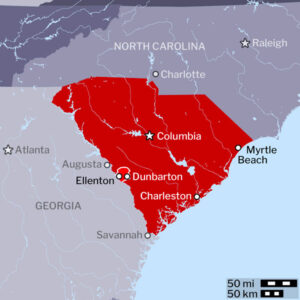 Dec 4: NAACP calls for desegregation at new South Carolina nuclear facility. Last week, the Atomic Energy Commission announced the construction of a massive 250,000 acre (100,000 hectare) nuclear facility along the Savannah River in South Carolina. The gigantic facility and the surrounding grounds will displace the towns of Ellenton and Dunbarton, and some 6,000 people, mostly poor African-American farmers and sharecroppers. Today, ,Clarence Mitchell, director of the NAACP’s Washington Bureau writes to AEC Chairman Gordon Dean that the announced project “must not be handicapped by the petty prejudices of South Carolina.” These prejudices “dictate expensive and ridiculous segregation based on race. In South Carolina, 42.9 per cent of the population is colored. This means that if there is any intelligent use of the local labor supply in that area a sizable number of colored people will be employed on the project. We ask now that we be given definite assurance that there will be no discrimination in the housing facilities which are provided for persons who work on the area. We ask also that there be no discrimination in the job opportunities of that section. We ask further that in the use of facilities there be no segregation of race.” The AEC officially bans discrimination based on race, but Mitchel says three has been “extensive discrimination based on race” at atom bomb plants elsewhere. Just last week, all five barbers hired by the concessionaire at Los Alamos, New Mexico, quit rather than cut the hair of an African-American security employee.
Dec 4: NAACP calls for desegregation at new South Carolina nuclear facility. Last week, the Atomic Energy Commission announced the construction of a massive 250,000 acre (100,000 hectare) nuclear facility along the Savannah River in South Carolina. The gigantic facility and the surrounding grounds will displace the towns of Ellenton and Dunbarton, and some 6,000 people, mostly poor African-American farmers and sharecroppers. Today, ,Clarence Mitchell, director of the NAACP’s Washington Bureau writes to AEC Chairman Gordon Dean that the announced project “must not be handicapped by the petty prejudices of South Carolina.” These prejudices “dictate expensive and ridiculous segregation based on race. In South Carolina, 42.9 per cent of the population is colored. This means that if there is any intelligent use of the local labor supply in that area a sizable number of colored people will be employed on the project. We ask now that we be given definite assurance that there will be no discrimination in the housing facilities which are provided for persons who work on the area. We ask also that there be no discrimination in the job opportunities of that section. We ask further that in the use of facilities there be no segregation of race.” The AEC officially bans discrimination based on race, but Mitchel says three has been “extensive discrimination based on race” at atom bomb plants elsewhere. Just last week, all five barbers hired by the concessionaire at Los Alamos, New Mexico, quit rather than cut the hair of an African-American security employee.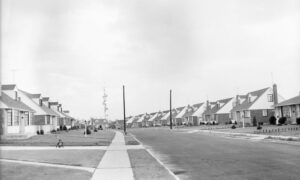 Dec 4: Two Levittown families find leases cancelled after children play with black kids. TWo families are in Supreme Court in Mineola, Long Island, charging that their landlord,, Levitt & Sons, Inc., are violating their civil liberties by refusing to allow them to renew their leases. Julius Novic and Adolph Ross, who live next door to each other, say they were asked to leave their homes when their leases are up because of objections to Negro children playing with their children on the lawns of their rented homes. The plaintiffs say the last July, they started inviting black children over to play with their own children two or three times a week. On August 3, Levitt & Sons reminded them that their leases end in November and instructed them to vacate at the time. The attorney for Levitt & Sons say that there is no law requiring the landlord to renew the leases. If the court issues an injunction otherwise, “the landlord will have lost control of his property and may as well sell it.” Levitt & Sons, the developers of Levittown, places a clause in its rent-to-own agreement that states, in capital letters and bold type, that the home cannot “be used or occupied by any person other than members of the Caucasian race.” The two families are represented by attorneys provided by the NAACP, the American Jewish Congress and the American Jewish Committee. The judge will reject the two families’ claim as “based on surmise and conjecture” and uphold the landlord’s right “to select tenants of his own choice.”
Dec 4: Two Levittown families find leases cancelled after children play with black kids. TWo families are in Supreme Court in Mineola, Long Island, charging that their landlord,, Levitt & Sons, Inc., are violating their civil liberties by refusing to allow them to renew their leases. Julius Novic and Adolph Ross, who live next door to each other, say they were asked to leave their homes when their leases are up because of objections to Negro children playing with their children on the lawns of their rented homes. The plaintiffs say the last July, they started inviting black children over to play with their own children two or three times a week. On August 3, Levitt & Sons reminded them that their leases end in November and instructed them to vacate at the time. The attorney for Levitt & Sons say that there is no law requiring the landlord to renew the leases. If the court issues an injunction otherwise, “the landlord will have lost control of his property and may as well sell it.” Levitt & Sons, the developers of Levittown, places a clause in its rent-to-own agreement that states, in capital letters and bold type, that the home cannot “be used or occupied by any person other than members of the Caucasian race.” The two families are represented by attorneys provided by the NAACP, the American Jewish Congress and the American Jewish Committee. The judge will reject the two families’ claim as “based on surmise and conjecture” and uphold the landlord’s right “to select tenants of his own choice.”![]()
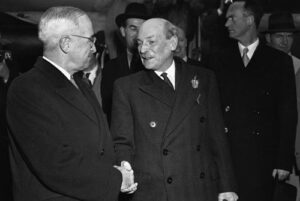 Dec 4: British Prime Minister arrives in Washington for talks. British Prime Minister Clement Attlee arrives at National Airport for six days of talks with President Harry Truman over the emergency facing U.N. forces in Korea. Today’s meetings are focused mainly on reviewing the latest military situation in Korea, and the security status of Europe, where efforts are underway of establishing a unified armed forces structure for the North Atlantic Treaty Organization (NATO). Attlee communicates European allies’ worries that Korea and Indo-China may come to represent “the bottomless pit of Asia,” and that it may pose too much of a distraction from security worries in Europe, where the Soviet Union poses a more immediate threat.
Dec 4: British Prime Minister arrives in Washington for talks. British Prime Minister Clement Attlee arrives at National Airport for six days of talks with President Harry Truman over the emergency facing U.N. forces in Korea. Today’s meetings are focused mainly on reviewing the latest military situation in Korea, and the security status of Europe, where efforts are underway of establishing a unified armed forces structure for the North Atlantic Treaty Organization (NATO). Attlee communicates European allies’ worries that Korea and Indo-China may come to represent “the bottomless pit of Asia,” and that it may pose too much of a distraction from security worries in Europe, where the Soviet Union poses a more immediate threat.
▲Tuesday, December 5
![]()
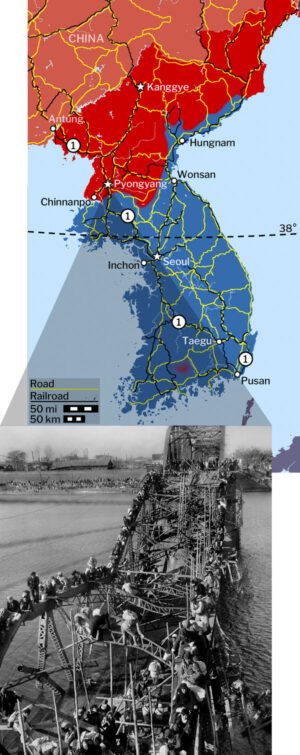 Dec 5: Korean War: U.N. forces evacuate Pyongyang. Facing an enemy that outnumbers U.N. forces by an estimated five-to-one or more, the Eighth Army continues its move southward in an effort to complete a systematic withdrawal, without incurring heavy battles with an overwhelming force, to a possible beachhead at Inchon and Seoul, if it comes to that. U.N. forces have been evacuating its stockpiles of material at Pyongyang and the small port at Chinnanpo. Whatever they can’t get out, they destroy in place. After receiving reports of enemy movement not just southward to Pyongyang, but also into the western valleys to the east for a possible westward flanking movement, the Eighth Army is ordered out of Pyongyang beginning yesterday morning. Today it completes its withdrawal to a line about fifteen miles (24 km) south of Pyongyang. Before leaving Pyongyang, the army blows up its massive stockpiles of ammunition that had been gathered for the past several weeks and is now much too large to evacuate with just a few days’ notice. Much of the city is ablaze when the rear guards destroy the last of the bridges over the Taedong river.
Dec 5: Korean War: U.N. forces evacuate Pyongyang. Facing an enemy that outnumbers U.N. forces by an estimated five-to-one or more, the Eighth Army continues its move southward in an effort to complete a systematic withdrawal, without incurring heavy battles with an overwhelming force, to a possible beachhead at Inchon and Seoul, if it comes to that. U.N. forces have been evacuating its stockpiles of material at Pyongyang and the small port at Chinnanpo. Whatever they can’t get out, they destroy in place. After receiving reports of enemy movement not just southward to Pyongyang, but also into the western valleys to the east for a possible westward flanking movement, the Eighth Army is ordered out of Pyongyang beginning yesterday morning. Today it completes its withdrawal to a line about fifteen miles (24 km) south of Pyongyang. Before leaving Pyongyang, the army blows up its massive stockpiles of ammunition that had been gathered for the past several weeks and is now much too large to evacuate with just a few days’ notice. Much of the city is ablaze when the rear guards destroy the last of the bridges over the Taedong river.
▲Wednesday, December 6
![]()
 Dec 6: Korean War, Chosin Reservoir: Marines begin evacuation from Hagaru-ri. The are around Hagaru-ri has been unusually quiet since the night of November 30. This has allowed 4,300 wounded troops to be evacuated via a temporary airstrip that was hastily constructed just south of the village. Those planes didn’t fly into Hagaru-ri empty. They came loaded with over five hundred fresh troops and as many supplies as the planes can handle. Today, the forces at Hagaru-ri begin a carefully planned move south through enemy territory to Koto-ri, with heavy and close support from U.N. air power and the coordinated movement of artillery that guarantees that at least half of it is in firing position at all times. Movement is slow but steady, as they encounter several Chinese roadbocks between Hagaru-ri and Hell Fire Valley, where, as expected, resistance was fierce. The lead elements of the column will reach Koto-ri the following morning, but those who follow will continue to encounter resistance. The final rear guard will leave Hagaru-ri late Thursday morning and make it to Koto-ri by 5:00 p.m. It will take 38 hours tom move then thousand men and one thousand vehicles eleven miles (18 km). Marine casualties during this withdrawal total 103 dead, 506 wounded and seven missing. (Army casualties are unknown.) The wounded will be evacuated from another hastily constructed airstrip northeast of Koto-ri before the rest of the force begins moving down the perilous Funchilin Pass.
Dec 6: Korean War, Chosin Reservoir: Marines begin evacuation from Hagaru-ri. The are around Hagaru-ri has been unusually quiet since the night of November 30. This has allowed 4,300 wounded troops to be evacuated via a temporary airstrip that was hastily constructed just south of the village. Those planes didn’t fly into Hagaru-ri empty. They came loaded with over five hundred fresh troops and as many supplies as the planes can handle. Today, the forces at Hagaru-ri begin a carefully planned move south through enemy territory to Koto-ri, with heavy and close support from U.N. air power and the coordinated movement of artillery that guarantees that at least half of it is in firing position at all times. Movement is slow but steady, as they encounter several Chinese roadbocks between Hagaru-ri and Hell Fire Valley, where, as expected, resistance was fierce. The lead elements of the column will reach Koto-ri the following morning, but those who follow will continue to encounter resistance. The final rear guard will leave Hagaru-ri late Thursday morning and make it to Koto-ri by 5:00 p.m. It will take 38 hours tom move then thousand men and one thousand vehicles eleven miles (18 km). Marine casualties during this withdrawal total 103 dead, 506 wounded and seven missing. (Army casualties are unknown.) The wounded will be evacuated from another hastily constructed airstrip northeast of Koto-ri before the rest of the force begins moving down the perilous Funchilin Pass.
![]() Dec 6: MacArthur instructed to refrain from discussing policy with the press. The Joint Chiefs of Staff issues a directive from President Truman that is addressed to the entire executive branch of government but is specifically in response to Gen. Douglas MacArthur, who has made several statements over the past week that touches on policy questions. The directive is intended to ensure that all public statements by an executive branch official is “accurate and fully in accord with the policies of the United States Government.” Specifically applicable to MacArthur, the instruction calls for “Officials overseasm including military commanders, are to clear all but routine statements with their departments, and to refrain from direct communication on military or foreign policy with newspapers, magazines or other publicity media in the United States.” European allies have expressed alarm by policy critiques by MacArthur that they say overstep his bounds as a military commander operating within the authorization of United Nations resolutions. Such policy questions, they point out, are properly addressed by civilian government officials of the allied governments in coordination with each other and not by generals in the field. British Prime Minister Clement Attlee is meeting with President Truman in Washington, D.C. this week specifically to address European concerns that the U.S. may act unilaterally in Korea without sufficient consultation with allies that are contributing troops and material to the war.
Dec 6: MacArthur instructed to refrain from discussing policy with the press. The Joint Chiefs of Staff issues a directive from President Truman that is addressed to the entire executive branch of government but is specifically in response to Gen. Douglas MacArthur, who has made several statements over the past week that touches on policy questions. The directive is intended to ensure that all public statements by an executive branch official is “accurate and fully in accord with the policies of the United States Government.” Specifically applicable to MacArthur, the instruction calls for “Officials overseasm including military commanders, are to clear all but routine statements with their departments, and to refrain from direct communication on military or foreign policy with newspapers, magazines or other publicity media in the United States.” European allies have expressed alarm by policy critiques by MacArthur that they say overstep his bounds as a military commander operating within the authorization of United Nations resolutions. Such policy questions, they point out, are properly addressed by civilian government officials of the allied governments in coordination with each other and not by generals in the field. British Prime Minister Clement Attlee is meeting with President Truman in Washington, D.C. this week specifically to address European concerns that the U.S. may act unilaterally in Korea without sufficient consultation with allies that are contributing troops and material to the war.
▲Thursday, December 7
![]()
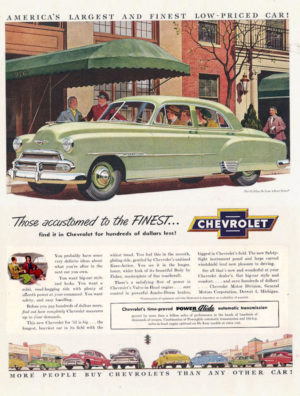 Dec 7: Chevrolet Division Motors unveils its 1951 lineup. The lineup, which will go on display in dealer showrooms on Saturday, features fourteen body types in the Styleline and Fleetline series. Both series are in two trim levels: special and deluxe. They all feature new front end styling, raised rear fenders, and combination stoplights and tail lights in a single assembly. The Styleline Deluxe convertible sports a clear plastic rear window for wider visibility. All cars feature the same six-cylinder engine delivering 92 horsepower from the previous model year, and a Powerglide automatic transmission remains optional on deluxe trim models for an extra $150 (about $1,540 today). Prices start at $1,593 ($16,350 today) for a two-door sedan and $1,640 (about $16,820 today) for a four-door. The top-of-the-line Styleline Deluxe Bel Air goes for $1,920 (about $19,700 today) and the convertible coupe sells for $2,026 (about $20,800 today). Production on the 1951 models began on November 21.
Dec 7: Chevrolet Division Motors unveils its 1951 lineup. The lineup, which will go on display in dealer showrooms on Saturday, features fourteen body types in the Styleline and Fleetline series. Both series are in two trim levels: special and deluxe. They all feature new front end styling, raised rear fenders, and combination stoplights and tail lights in a single assembly. The Styleline Deluxe convertible sports a clear plastic rear window for wider visibility. All cars feature the same six-cylinder engine delivering 92 horsepower from the previous model year, and a Powerglide automatic transmission remains optional on deluxe trim models for an extra $150 (about $1,540 today). Prices start at $1,593 ($16,350 today) for a two-door sedan and $1,640 (about $16,820 today) for a four-door. The top-of-the-line Styleline Deluxe Bel Air goes for $1,920 (about $19,700 today) and the convertible coupe sells for $2,026 (about $20,800 today). Production on the 1951 models began on November 21.
▲Friday, December 8
![]()
 Dec 8: Korean War, Central Mountains: Communist forces pierce the 38th Parallel. The South’s ROK forces in west central Korea have taken the brunt of Chinese attacks ever since the Chinese launched its Second Phase Offensive almost two weeks ago. Badly weakened and demoralized, they have been pushed back as far south as Yonchon (Yeoncheon) and Chunchon (Chuncheon), which brings them south of the 38th Parallel. This will force the American forces south of Pyongyang to fall back even further to prevent Communist forces from marching into Seoul behind the American lines.
Dec 8: Korean War, Central Mountains: Communist forces pierce the 38th Parallel. The South’s ROK forces in west central Korea have taken the brunt of Chinese attacks ever since the Chinese launched its Second Phase Offensive almost two weeks ago. Badly weakened and demoralized, they have been pushed back as far south as Yonchon (Yeoncheon) and Chunchon (Chuncheon), which brings them south of the 38th Parallel. This will force the American forces south of Pyongyang to fall back even further to prevent Communist forces from marching into Seoul behind the American lines.
![]() Dec 8: U.S. Korean War, Chosin Reservoir: American forces resume evacuation from Koto-ri. Marine and Army units at Koto-ri begin moving south and into the treacherous Funchilin Pass. Bogged down by a heavy snowstorm that limited air cover against moderate to strong Chinese resistance. At about the same time, The 1st Battalion, 1st Marines at Chinhung-ni move northward to clear Funchilin Pass from the south. During the day, they cover the lower third of the twisty one-lane road going up the pass toward the gatehouse, and dislodge a Chinese blocking force on Hill 891 in the process. The U.S. forces from Koto-ri cover the high ground south of the village and. They drive away Chinese blocking forces from Hill 304 and the western slope of Hill 1457, make it to within a mile (1.6 km) of a gatehouse where a narrow bridge had been blown out by Chinese forces about a week earlier. The gatehouse and bridge straddle four pinstocks, or large water pipes, which carry water down the mountains from the Chosin Reservoir to a series of hydroelectric plants below. The gatehouse is hard against the mountainside, and the narrow one-lane road and blown-out bridge are immediately adjacent to the building. With no way to bypass the blown out bridge, the Marines airdropped eight 2,500-lb (1,130 kg) treadway bridges yesterday. One was damaged, one fell into enemy hands. Only four of the remaining six are actually needed to span the gap. They will be placed across the gap the next day to allow the column to move forward.
Dec 8: U.S. Korean War, Chosin Reservoir: American forces resume evacuation from Koto-ri. Marine and Army units at Koto-ri begin moving south and into the treacherous Funchilin Pass. Bogged down by a heavy snowstorm that limited air cover against moderate to strong Chinese resistance. At about the same time, The 1st Battalion, 1st Marines at Chinhung-ni move northward to clear Funchilin Pass from the south. During the day, they cover the lower third of the twisty one-lane road going up the pass toward the gatehouse, and dislodge a Chinese blocking force on Hill 891 in the process. The U.S. forces from Koto-ri cover the high ground south of the village and. They drive away Chinese blocking forces from Hill 304 and the western slope of Hill 1457, make it to within a mile (1.6 km) of a gatehouse where a narrow bridge had been blown out by Chinese forces about a week earlier. The gatehouse and bridge straddle four pinstocks, or large water pipes, which carry water down the mountains from the Chosin Reservoir to a series of hydroelectric plants below. The gatehouse is hard against the mountainside, and the narrow one-lane road and blown-out bridge are immediately adjacent to the building. With no way to bypass the blown out bridge, the Marines airdropped eight 2,500-lb (1,130 kg) treadway bridges yesterday. One was damaged, one fell into enemy hands. Only four of the remaining six are actually needed to span the gap. They will be placed across the gap the next day to allow the column to move forward.
![]()
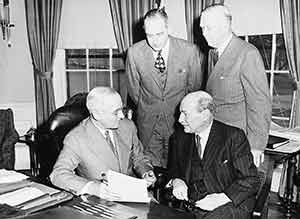 Dec 8: Truman and Attlee wrap up talks on Asia. After five days of talks in Washington, D.C., British Prime Minister Clement Attlee and U.S. President Harry Truman issue a joint communiqué calling for Communist China to negotiate a peaceful solution to the Korean War on the basis of “a free and independent Korea.” The original breaking point prompting Attlee’s sudden trip to Washington — Truman’s sudden and terrifying announcement that using nuclear weapons in Korea was an option — is addressed by U.S. assurances that Canada and Britain would be consulted before any such decision is made. There are also agreements on the appointment of a Supreme Commander for NATO as soon as possible (Gen. Dwight D. Eisenhower is widely assumed to be the designee), on speeding up plans for a common European defense against the Soviet Union, and on re-arming Western Europe. But disagreements remain, especially where Britain shares with European allies serious misgivings about U.S. policy with regard to China. Britain, which recognizes the Communist government in Peiping (Beijing), is openly critical of U.S. recognition of Gen. Chiang Kai-shek’s Nationalist Government on Taiwan as the only legitimate government of China. Britain and European allies criticize the U.S.’s unilateral decision to send the Seventh Fleet to Taiwan and its opposition to proposals to allow Communist China to be brought into the United Nations. The Europeans also raise questions about crossing the Thirty-eighth Parallel, about rejecting warnings that China was prepared to intervene in Korea, and about brushing aside the creation of a buffer zone in northern Korea.
Dec 8: Truman and Attlee wrap up talks on Asia. After five days of talks in Washington, D.C., British Prime Minister Clement Attlee and U.S. President Harry Truman issue a joint communiqué calling for Communist China to negotiate a peaceful solution to the Korean War on the basis of “a free and independent Korea.” The original breaking point prompting Attlee’s sudden trip to Washington — Truman’s sudden and terrifying announcement that using nuclear weapons in Korea was an option — is addressed by U.S. assurances that Canada and Britain would be consulted before any such decision is made. There are also agreements on the appointment of a Supreme Commander for NATO as soon as possible (Gen. Dwight D. Eisenhower is widely assumed to be the designee), on speeding up plans for a common European defense against the Soviet Union, and on re-arming Western Europe. But disagreements remain, especially where Britain shares with European allies serious misgivings about U.S. policy with regard to China. Britain, which recognizes the Communist government in Peiping (Beijing), is openly critical of U.S. recognition of Gen. Chiang Kai-shek’s Nationalist Government on Taiwan as the only legitimate government of China. Britain and European allies criticize the U.S.’s unilateral decision to send the Seventh Fleet to Taiwan and its opposition to proposals to allow Communist China to be brought into the United Nations. The Europeans also raise questions about crossing the Thirty-eighth Parallel, about rejecting warnings that China was prepared to intervene in Korea, and about brushing aside the creation of a buffer zone in northern Korea.
![]()
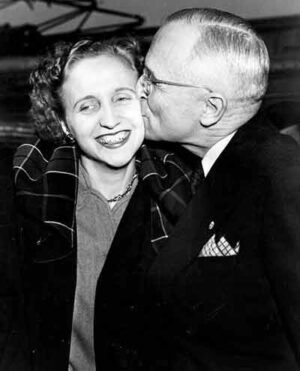 Dec 8: Truman scolds music critic for “lousy review” of daughter. President Truman’s daughter, Margeret, is a professional singer, a coloratura soprano who has appeared with several major orchestras. Music reviewers generally look favorably upon her craft. When they aren’t inclined to give positive reviews, they tend to opt for more diplomatic language, perhaps out of deference to her father. On Tuesday night, she gave a concert recital at Constitution Hall in Washington, D.C. The President and the visiting British Prime Minister Clement Attlee attended. The next day, Washington Post music critic Paul Hume called Miss Truman “a unique American phenomenon with a pleasant voice of little size and fair quality.” But she “cannot sing very well. She is flat a good deal of the time — more last night than at any time we have heard her in past years.” Hume soon received a letter from “H.S.T.”, later confirmed to be Harry S. Truman himself. The letter, as published today in the Washington Daily News, allegedly says, in part: “I have just read your lousy review buried in the back pages. You sound like a frustrated old man who never made a success, an eight-ulcer man on a four-ulcer job … I never met you, but if I do you’ll need a new nose and plenty of beefsteak and perhaps a supporter below.” Hume confirms he received a letter, but says the version in the Daily News isn’t entirely accurate, but it’s close. He takes Truman’s tirade in stride. Noting that Truman’s close childhood friend and press secretary had suddenly died at the wHite House just a few hours before the concert, Hume says, “I can only say that a man suffering the loss of a close friend and carrying the terrible burden of the present world crisis ought to be indulged in an occasional outburst of temper.”
Dec 8: Truman scolds music critic for “lousy review” of daughter. President Truman’s daughter, Margeret, is a professional singer, a coloratura soprano who has appeared with several major orchestras. Music reviewers generally look favorably upon her craft. When they aren’t inclined to give positive reviews, they tend to opt for more diplomatic language, perhaps out of deference to her father. On Tuesday night, she gave a concert recital at Constitution Hall in Washington, D.C. The President and the visiting British Prime Minister Clement Attlee attended. The next day, Washington Post music critic Paul Hume called Miss Truman “a unique American phenomenon with a pleasant voice of little size and fair quality.” But she “cannot sing very well. She is flat a good deal of the time — more last night than at any time we have heard her in past years.” Hume soon received a letter from “H.S.T.”, later confirmed to be Harry S. Truman himself. The letter, as published today in the Washington Daily News, allegedly says, in part: “I have just read your lousy review buried in the back pages. You sound like a frustrated old man who never made a success, an eight-ulcer man on a four-ulcer job … I never met you, but if I do you’ll need a new nose and plenty of beefsteak and perhaps a supporter below.” Hume confirms he received a letter, but says the version in the Daily News isn’t entirely accurate, but it’s close. He takes Truman’s tirade in stride. Noting that Truman’s close childhood friend and press secretary had suddenly died at the wHite House just a few hours before the concert, Hume says, “I can only say that a man suffering the loss of a close friend and carrying the terrible burden of the present world crisis ought to be indulged in an occasional outburst of temper.”
▲Saturday, December 9
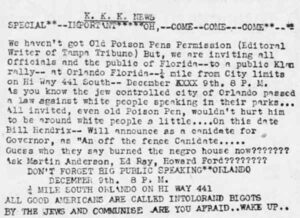 Dec 9: Klan leader to run for governor of Florida. Bill Hendrix, Grand Dragon of the Tallahassee-based Southern Knights of the Ku Klux Klan, announces that he will run for governor in 1952. He makes the announcement at a rally held outside of Orlando’s city limits, at a muddy vacant lot at 20th Street and Orange Blossom Trail. In October, Orlando passed anti-Klan ordinances which prohibits the Klan from holding rallies at city parks. “City commissioners won’t let white people use Eola Park,” says Hendrix. “A Jew seems to run Orlando.” Hendrix complains that Orlando papers and the Tampa Tribune have speared him and the Klan. Tom Hamilton, Grand Dragon of the Carolina Klans, offers a lengthy “prayer” praising the Klan for standing for “white Gentile Protestants.” He then charges that “Asiatic Jews our running our country at present.” The Orlando Sentinel reports that “both grand dragons used language in their talks which is unfit to print.” The Tampa Tribune publishes the post card sent by the Klan advertising the rally. Following the rally, a parade of about thirty-five to forty cars parade down Orange Avenue, Orlando’s main business street, with horns blaring and signs proclaiming “Bill Hendrix for Governor.”
Dec 9: Klan leader to run for governor of Florida. Bill Hendrix, Grand Dragon of the Tallahassee-based Southern Knights of the Ku Klux Klan, announces that he will run for governor in 1952. He makes the announcement at a rally held outside of Orlando’s city limits, at a muddy vacant lot at 20th Street and Orange Blossom Trail. In October, Orlando passed anti-Klan ordinances which prohibits the Klan from holding rallies at city parks. “City commissioners won’t let white people use Eola Park,” says Hendrix. “A Jew seems to run Orlando.” Hendrix complains that Orlando papers and the Tampa Tribune have speared him and the Klan. Tom Hamilton, Grand Dragon of the Carolina Klans, offers a lengthy “prayer” praising the Klan for standing for “white Gentile Protestants.” He then charges that “Asiatic Jews our running our country at present.” The Orlando Sentinel reports that “both grand dragons used language in their talks which is unfit to print.” The Tampa Tribune publishes the post card sent by the Klan advertising the rally. Following the rally, a parade of about thirty-five to forty cars parade down Orange Avenue, Orlando’s main business street, with horns blaring and signs proclaiming “Bill Hendrix for Governor.”![]()
 Dec 9: Korean War, Chosin Reservoir: Retreating forces cross the gatehouse gap. Yesterday, the columns evacuating from the Chosin (Changjin) Reservoir halted in Funchilin Pass, about a mile (1.6 k.m) from where a narrow, windy one-lane mountain road comes to a dramatic drop-off at a reservoir gatehouse That’s where the Chinese have blown out a bridge about a week earlier. Six treadway bridges were parachuted to Koto-ri two days ago. Today, the skies are clear, which allows heavy air support to resume to support the 7th Marines as they reach the bridge site at around noon. The treadway bridges are put into place allowing the column to resume its way southward at about 6:00 p.m. Traffic will continue across the bridge overnight and the next two days. Meanwhile, Marines from the south fight a stiff battle for Hill 1081, capturing at around 3:00 p.m. An advance patrol from the 7th Marines moving south reach Hill 1081 shortly after, making first contact with the southern force.
Dec 9: Korean War, Chosin Reservoir: Retreating forces cross the gatehouse gap. Yesterday, the columns evacuating from the Chosin (Changjin) Reservoir halted in Funchilin Pass, about a mile (1.6 k.m) from where a narrow, windy one-lane mountain road comes to a dramatic drop-off at a reservoir gatehouse That’s where the Chinese have blown out a bridge about a week earlier. Six treadway bridges were parachuted to Koto-ri two days ago. Today, the skies are clear, which allows heavy air support to resume to support the 7th Marines as they reach the bridge site at around noon. The treadway bridges are put into place allowing the column to resume its way southward at about 6:00 p.m. Traffic will continue across the bridge overnight and the next two days. Meanwhile, Marines from the south fight a stiff battle for Hill 1081, capturing at around 3:00 p.m. An advance patrol from the 7th Marines moving south reach Hill 1081 shortly after, making first contact with the southern force.
![]() Dec 9: Korean War: Wonsan evacuated. The evacuation began last Sunday. Since then, they’ve evacuated 3,800 troops, 1,100 vehicles, 10,000 tons of other cargo and 7,000 refugees. The Marines are sent north to Hungnam where they will take part of that city’s evacuation. The rest moves south to Pusan (Busan), where they will be redeployed to support the defense of the 38th Parallel. Elsewhere on the peninsula, U.N. forces are able to hold their lines as the Communist forces ease up on their advance southward.
Dec 9: Korean War: Wonsan evacuated. The evacuation began last Sunday. Since then, they’ve evacuated 3,800 troops, 1,100 vehicles, 10,000 tons of other cargo and 7,000 refugees. The Marines are sent north to Hungnam where they will take part of that city’s evacuation. The rest moves south to Pusan (Busan), where they will be redeployed to support the defense of the 38th Parallel. Elsewhere on the peninsula, U.N. forces are able to hold their lines as the Communist forces ease up on their advance southward.
![]()
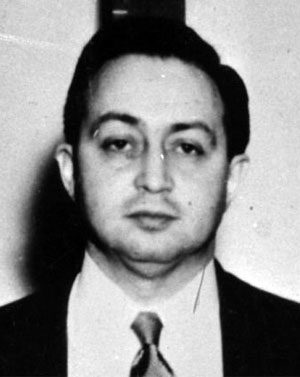 Dec 9: Harry Gold sentenced as atomic spy. Harry Gold, a former laboratory chemist at Philadelphia General Hospital who was arrested on espionage charges in May, is sentenced to a maximum of thirty years in prison after pleading guilty of espionage. He has admitted to acting as a go-between for Soviet spies and Dr. Klaus Fuchs, a British nuclear physicist working on the Manhattan Project during World War II. Fuchs was arrested in January and convicted in March in a London court for providing the Soviets precise information, including blueprints, of the atomic bomb dropped on Nagasaki, Japan. Later, Fuchs passed along much of what American scientists had learned about a theoretical hydrogen bomb. Gold’s confession led to the arrest of David Greenglass in June. Greenglass, in turn, implicated his sister and brother-in-law Ethel and Julius Rosenberg, who are still awaiting trial. Federal District Judge James P. McGranery acknowledges statements by Gold and federal prosecutors that “the defendant, in addition to confessing his guilt, has attempted to atone for his crimes against the United States by actively cooperating with the Government to cause the apprehension of and the conviction of co-conspirators … the court, nevertheless, must reflect upon the need to deter others in the future.” The thirty year sentence is five years more than that recommended by U.S. Attorney General J. Howard McGrath, but it avoids the death penalty, the maximum allowed under the law. He will be paroled from prison in 1965.
Dec 9: Harry Gold sentenced as atomic spy. Harry Gold, a former laboratory chemist at Philadelphia General Hospital who was arrested on espionage charges in May, is sentenced to a maximum of thirty years in prison after pleading guilty of espionage. He has admitted to acting as a go-between for Soviet spies and Dr. Klaus Fuchs, a British nuclear physicist working on the Manhattan Project during World War II. Fuchs was arrested in January and convicted in March in a London court for providing the Soviets precise information, including blueprints, of the atomic bomb dropped on Nagasaki, Japan. Later, Fuchs passed along much of what American scientists had learned about a theoretical hydrogen bomb. Gold’s confession led to the arrest of David Greenglass in June. Greenglass, in turn, implicated his sister and brother-in-law Ethel and Julius Rosenberg, who are still awaiting trial. Federal District Judge James P. McGranery acknowledges statements by Gold and federal prosecutors that “the defendant, in addition to confessing his guilt, has attempted to atone for his crimes against the United States by actively cooperating with the Government to cause the apprehension of and the conviction of co-conspirators … the court, nevertheless, must reflect upon the need to deter others in the future.” The thirty year sentence is five years more than that recommended by U.S. Attorney General J. Howard McGrath, but it avoids the death penalty, the maximum allowed under the law. He will be paroled from prison in 1965.
▲Sunday, December 10
![]()
 Dec 10: Korean War, Chosin Reservoir: U.N. forces withdraw from Koto-ri.The first members of the “Frozen Chosin” arrive at Chinhung-ni at 2:45 a.m. after receiving only occasional sniper fire after crossing the treadway bridge in Funchilin Pass. As more survivors come, they are trucked down to Majon-dong, where they are loaded onto a narrow gauge railroad and taken to Hamhung. At mid-afternoon, the last troops leave Koto-ri. Behind them are hundreds of refugees. Progress is slow. The freezing temperatures cause the brakes on a tank to freeze up, halting traffic on the one-lane road that is barely more than a trail. As tankers work to free the tank, Chinese troops hidden among the refugees and in the high ground above the road open fire, taking out the last seven tanks in the line, and killing the crews of the last two. After the remaining tanks and troops cross the treadway bridge, they destroy it behind them. The rear guard will make it safely to Chinhung-ni the following morning. Meanwhile, between late afternoon and dawn the following morning, Chinese forces strike three times against American forces at Sudong. During the second attack shortly after midnight, they will open fire from houses inside Sudong and swarm onto the road as a convoy carrying U.S. Marines are passing through. American forces will organize an overnight counterattack and clear the road again by daybreak. The last of the Chosin survivors will reach Majon-dong tomorrow night.
Dec 10: Korean War, Chosin Reservoir: U.N. forces withdraw from Koto-ri.The first members of the “Frozen Chosin” arrive at Chinhung-ni at 2:45 a.m. after receiving only occasional sniper fire after crossing the treadway bridge in Funchilin Pass. As more survivors come, they are trucked down to Majon-dong, where they are loaded onto a narrow gauge railroad and taken to Hamhung. At mid-afternoon, the last troops leave Koto-ri. Behind them are hundreds of refugees. Progress is slow. The freezing temperatures cause the brakes on a tank to freeze up, halting traffic on the one-lane road that is barely more than a trail. As tankers work to free the tank, Chinese troops hidden among the refugees and in the high ground above the road open fire, taking out the last seven tanks in the line, and killing the crews of the last two. After the remaining tanks and troops cross the treadway bridge, they destroy it behind them. The rear guard will make it safely to Chinhung-ni the following morning. Meanwhile, between late afternoon and dawn the following morning, Chinese forces strike three times against American forces at Sudong. During the second attack shortly after midnight, they will open fire from houses inside Sudong and swarm onto the road as a convoy carrying U.S. Marines are passing through. American forces will organize an overnight counterattack and clear the road again by daybreak. The last of the Chosin survivors will reach Majon-dong tomorrow night.
▲Monday, December 11
Last Day of Chanukah
![]()
 Dec 11: Korean War, Chosin Reservoir: The “Chosin Few” begin evacuating Hungnam. The exhausted and battered 1st Marine Division assembles between the port of Hungnam and Yonpo airfield as it comes down from Majong-dong and Chinhung-ni. The Division is only at half strength. Since the end of October 718 have been killed, 2,508 wounded and 192 missing in action. In addition, there are 7,313 non-battle casualties, mostly from frostbite. Some rifle companies are down to as little as 25 to 30 percent of strength. The survivors become the “Chosin Few.” Because of the harrowing events they’ve been through the past two weeks, they are given the opportunity to evacuate Hungnam first. They will be loaded onto ships over the next three days and sent down to Pusan (Busan), where they will unload and move to their final assembly area at Masan. After three weeks of R&R, replenishment and Christmas celebrations, they will be ready to return to combat in January. Back at Hungnan, the evacuation of men and material will continue for another two weeks.
Dec 11: Korean War, Chosin Reservoir: The “Chosin Few” begin evacuating Hungnam. The exhausted and battered 1st Marine Division assembles between the port of Hungnam and Yonpo airfield as it comes down from Majong-dong and Chinhung-ni. The Division is only at half strength. Since the end of October 718 have been killed, 2,508 wounded and 192 missing in action. In addition, there are 7,313 non-battle casualties, mostly from frostbite. Some rifle companies are down to as little as 25 to 30 percent of strength. The survivors become the “Chosin Few.” Because of the harrowing events they’ve been through the past two weeks, they are given the opportunity to evacuate Hungnam first. They will be loaded onto ships over the next three days and sent down to Pusan (Busan), where they will unload and move to their final assembly area at Masan. After three weeks of R&R, replenishment and Christmas celebrations, they will be ready to return to combat in January. Back at Hungnan, the evacuation of men and material will continue for another two weeks.
![]() Dec 11: Korean War, West Coast: U.N. forces move to new defensive lines. The South Koreans in the central mountains north of Chunchon make modest gains and push the Communist forces above the 38th Parallel. At the same time, the U.S. Eighth Army and attached U.N. forces to south of Pyongyang draw slowly southward toward Munsan-ni. Over the next two weeks, U.N. forces will create a new line of defense running roughly from Munsan-ni to Yangyang, which will provide the shortest possible defense line across the peninsula.
Dec 11: Korean War, West Coast: U.N. forces move to new defensive lines. The South Koreans in the central mountains north of Chunchon make modest gains and push the Communist forces above the 38th Parallel. At the same time, the U.S. Eighth Army and attached U.N. forces to south of Pyongyang draw slowly southward toward Munsan-ni. Over the next two weeks, U.N. forces will create a new line of defense running roughly from Munsan-ni to Yangyang, which will provide the shortest possible defense line across the peninsula.
![]() Dec 11: Korean War: North Korean refugees overwhelm Seoul. The flood of refugees pour into an already crowded and frightened Seoul after overwhelming South Korean army and police checkpoints to the north. The New York Times reports that the South Korean security forces are “applying drastic methods” to weed out Communist guerrillas who might be hiding among the refugees. “There is little doubt of what is being done with these suspected guerrillas,” says the Times. “Throughout the night in Seoul shots are heard in the ‘national police’ compound. Reporters have asked the police officers what the shooting is about. The police explain that there is a practice range in the compound, which adjoins the press billets. The moans sometimes heard immediately after a burst of fire, the policemen assert, come from unhappy marksmen who have missed the bullseye.” Meanwhile, Seoul residents are looking for any way to escape south. Passes are required of all Koreans riding in trucks. They are officially limited to families of South Korean officials who would be shot if captured by the Communists. But anyone with connections can buy them for the right price. “One trusted Korean employe of a foreign company said he had had to pay $250 (about $2,600 today) for the transportation southward of his wife and three children. The price included passes and a ride on top of a Korean Army truck.”
Dec 11: Korean War: North Korean refugees overwhelm Seoul. The flood of refugees pour into an already crowded and frightened Seoul after overwhelming South Korean army and police checkpoints to the north. The New York Times reports that the South Korean security forces are “applying drastic methods” to weed out Communist guerrillas who might be hiding among the refugees. “There is little doubt of what is being done with these suspected guerrillas,” says the Times. “Throughout the night in Seoul shots are heard in the ‘national police’ compound. Reporters have asked the police officers what the shooting is about. The police explain that there is a practice range in the compound, which adjoins the press billets. The moans sometimes heard immediately after a burst of fire, the policemen assert, come from unhappy marksmen who have missed the bullseye.” Meanwhile, Seoul residents are looking for any way to escape south. Passes are required of all Koreans riding in trucks. They are officially limited to families of South Korean officials who would be shot if captured by the Communists. But anyone with connections can buy them for the right price. “One trusted Korean employe of a foreign company said he had had to pay $250 (about $2,600 today) for the transportation southward of his wife and three children. The price included passes and a ride on top of a Korean Army truck.”
![]()
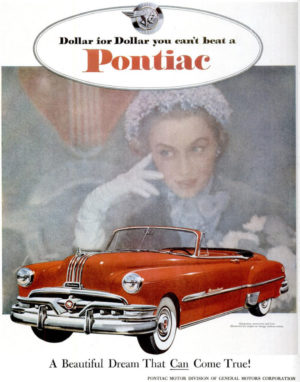 Dec 11: New 1951 Pontiacs go on display in dealer showrooms. Styling changes for the Chieftain and Streamliner are mainly confined to a few tweaks here and there: a new grille treatment, a new stylized Indian head hood ornament, and updated “silver streak” chrome bands on the hood that runs from the radiator to the windshield. Instead, the publicity blitz focuses on celebrating the division’s 25th year The Chieftain comes in six body styles, all of which can be equipped with either a six cylinder or eight cylinder engine. Chieftains sixes start at $1,852 (about $19,000 today) for a two-door sedan and top out at $2,265 ($23,300 today) for a convertible or $2,201 ($22,600) for a stylish Catalina hard top. Streamliners, which are based on an older design, come in only one body style, a sedan coupe, although a station wagon based on the Streamliner platform is also available. Streamliner sixes start at $1,831 ($18,800 today) and the station wagon starts at $2,370 (24,300 today). Eight cylinder engines are available across the entire lineup, adding about $70 ($720 today) to the price. A Hydra-matic transmission is optional at $158 ($1,625 today). This will be the Streamliner’s last year of production. It had been introduced in 1942, just before all civilian automobile production ended due to the war, and it was the first Pontiac model that became available when production resumed for the 1946 model year.
Dec 11: New 1951 Pontiacs go on display in dealer showrooms. Styling changes for the Chieftain and Streamliner are mainly confined to a few tweaks here and there: a new grille treatment, a new stylized Indian head hood ornament, and updated “silver streak” chrome bands on the hood that runs from the radiator to the windshield. Instead, the publicity blitz focuses on celebrating the division’s 25th year The Chieftain comes in six body styles, all of which can be equipped with either a six cylinder or eight cylinder engine. Chieftains sixes start at $1,852 (about $19,000 today) for a two-door sedan and top out at $2,265 ($23,300 today) for a convertible or $2,201 ($22,600) for a stylish Catalina hard top. Streamliners, which are based on an older design, come in only one body style, a sedan coupe, although a station wagon based on the Streamliner platform is also available. Streamliner sixes start at $1,831 ($18,800 today) and the station wagon starts at $2,370 (24,300 today). Eight cylinder engines are available across the entire lineup, adding about $70 ($720 today) to the price. A Hydra-matic transmission is optional at $158 ($1,625 today). This will be the Streamliner’s last year of production. It had been introduced in 1942, just before all civilian automobile production ended due to the war, and it was the first Pontiac model that became available when production resumed for the 1946 model year.
▲Tuesday, December 12
![]() Dec 12: U.S. Army increases manpower requirements by 70,000. The Army asks the Selective Service to order 160,000 draftees into training camps in January and February. This is 70,000 more men than the Army was planning ten days ago. This will bering the Army’s worldwide estimated strength to 1,250,000 men by the end of February. When the Korean War broke out in June, the army’s strength stood at 593,000.
Dec 12: U.S. Army increases manpower requirements by 70,000. The Army asks the Selective Service to order 160,000 draftees into training camps in January and February. This is 70,000 more men than the Army was planning ten days ago. This will bering the Army’s worldwide estimated strength to 1,250,000 men by the end of February. When the Korean War broke out in June, the army’s strength stood at 593,000.
![]()
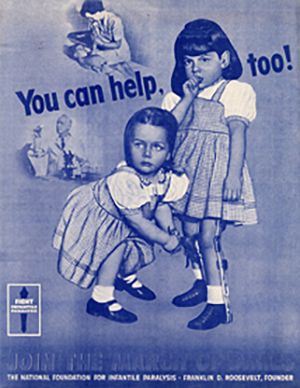 Dec 12: Polio outbreak set to be the second-worst on record. The National Foundation for Infantile Paralysis, better known for its March of Dimes fundraising for polio, announces that with 31,989 cases of polio reported from the first of the year to December 2, this year is set to become the second most severe polio year in the nation’s history. This year’s polio season, which normally gets underway in the summer, didn’t reach its peak until September. The 597 new cases for the week ending December 2 is the highest figure for that point in the year since the U.S. Public Health Service began keeping weekly records for polio cases in 1927. When combined with the carry-over cases from last year, which broke all records to become the worst epidemic so far, has cost the Nation Foundation $20 million (about $210 today) for care and treatment. It is estimated that the organization will still owe another $5 million ($52 million today) in hospital bills by the end of the year.
Dec 12: Polio outbreak set to be the second-worst on record. The National Foundation for Infantile Paralysis, better known for its March of Dimes fundraising for polio, announces that with 31,989 cases of polio reported from the first of the year to December 2, this year is set to become the second most severe polio year in the nation’s history. This year’s polio season, which normally gets underway in the summer, didn’t reach its peak until September. The 597 new cases for the week ending December 2 is the highest figure for that point in the year since the U.S. Public Health Service began keeping weekly records for polio cases in 1927. When combined with the carry-over cases from last year, which broke all records to become the worst epidemic so far, has cost the Nation Foundation $20 million (about $210 today) for care and treatment. It is estimated that the organization will still owe another $5 million ($52 million today) in hospital bills by the end of the year.
▲Wednesday, December 13
![]() Dec 13: Peiping (Beijing) warns U.N. to get out of Korea. The first public reaction in Communist China to talks between President Truman and British Prime Minister Clement Attlee appears in a defiant editorial in the People’s Daily, the leading official organ of the Chinese Communist Party. “Truman and Attlee indicated their aggressive forces would ignore the appeal of the people of the entire world for the withdrawal of all foreign troops from Korea and would continue to remain in Korea. Because of this, the Chinese people’s volunteers’ army will continue to exert their untiring effort to deal the enemy heavy blows in order to force the enemy to pull back his bloody hand of aggression and withdraw his spear of aggression.”
Dec 13: Peiping (Beijing) warns U.N. to get out of Korea. The first public reaction in Communist China to talks between President Truman and British Prime Minister Clement Attlee appears in a defiant editorial in the People’s Daily, the leading official organ of the Chinese Communist Party. “Truman and Attlee indicated their aggressive forces would ignore the appeal of the people of the entire world for the withdrawal of all foreign troops from Korea and would continue to remain in Korea. Because of this, the Chinese people’s volunteers’ army will continue to exert their untiring effort to deal the enemy heavy blows in order to force the enemy to pull back his bloody hand of aggression and withdraw his spear of aggression.”
▲Thursday, December 14
![]() Dec 14: Wildcat railroad strike hits four cities. It started in Chicago yesterday and spread to Washington, Baltimore and St. Louis today. Already, rail gridlock caused by the Chicago strike has caused layoffs at steel mills and Chicago stock yards. The Post Office is imposing heavy restrictions on parcels, newspapers, magazines and other non-essential material in order to ensure that critical medical supplies can get through. An estimated 10,000 members of the Brotherhood of Railroad Trainmen are out on a strick which has not been authorized by the union. The strikers are acting in defiance of the U.S. Army, which has been running the nation’s railroads since they were nationalized in August. At issue is a twenty-one month old demand for reducing the workweek from forty-eight hours to forty, with no cut in pay. This would, in effect, be an pay cut of 31¢ (about $3.25 today) per hour. Switchmen now work for $12.06 (about $125 today) per day for a six-day, forty-eight-hour week.
Dec 14: Wildcat railroad strike hits four cities. It started in Chicago yesterday and spread to Washington, Baltimore and St. Louis today. Already, rail gridlock caused by the Chicago strike has caused layoffs at steel mills and Chicago stock yards. The Post Office is imposing heavy restrictions on parcels, newspapers, magazines and other non-essential material in order to ensure that critical medical supplies can get through. An estimated 10,000 members of the Brotherhood of Railroad Trainmen are out on a strick which has not been authorized by the union. The strikers are acting in defiance of the U.S. Army, which has been running the nation’s railroads since they were nationalized in August. At issue is a twenty-one month old demand for reducing the workweek from forty-eight hours to forty, with no cut in pay. This would, in effect, be an pay cut of 31¢ (about $3.25 today) per hour. Switchmen now work for $12.06 (about $125 today) per day for a six-day, forty-eight-hour week.
![]() Dec 14: Elizabeth Taylor to divorce Nick Hilton. She says in a statement: “I am very sorry that Nick and I are unable to adjust our differences, and that we have come to a final party of the ways. We both regret this decision, but after personal discussions we realize that there is no possibility of a reconciliation.” This is the first marriage for both. They were married just last May, and the divorce will become final in January.
Dec 14: Elizabeth Taylor to divorce Nick Hilton. She says in a statement: “I am very sorry that Nick and I are unable to adjust our differences, and that we have come to a final party of the ways. We both regret this decision, but after personal discussions we realize that there is no possibility of a reconciliation.” This is the first marriage for both. They were married just last May, and the divorce will become final in January.
▲Friday, December 15
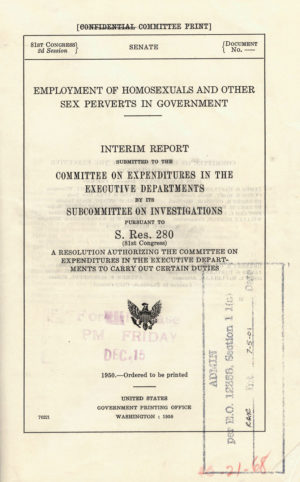 Dec 15: The Senate Committee on Expenditures in the Executive Departments issues its report, “Employment of Homosexuals and Other Sexual Perverts.” The subcommittee, chaired by Sen. Clyde Hoey (D-NC), concludes that homosexuals should not be employed by the federal government because they are “generally unsuitable” and constitute a security risk due to their supposed vulnerability to blackmail, despite any evidence of this having occurred. The subcommittee’s report also says that gay people lack emotional stability, have weak “moral fiber,” are a bad influence on the young, and attract others of their kind to government service. “One homosexual,” the report warns, “can pollute a Government office.” The report excludes testimony from authorities and witnesses who urge a more tolerant approach. The Hoey Committee doesn’t make any legislative recommendations, but it urges government agencies and the Civil Service Commission to aggressively enforce their existing policies banning gays from federal employment. The report will be widely distributed and become highly influential in shaping federal policy for decades to come.
Dec 15: The Senate Committee on Expenditures in the Executive Departments issues its report, “Employment of Homosexuals and Other Sexual Perverts.” The subcommittee, chaired by Sen. Clyde Hoey (D-NC), concludes that homosexuals should not be employed by the federal government because they are “generally unsuitable” and constitute a security risk due to their supposed vulnerability to blackmail, despite any evidence of this having occurred. The subcommittee’s report also says that gay people lack emotional stability, have weak “moral fiber,” are a bad influence on the young, and attract others of their kind to government service. “One homosexual,” the report warns, “can pollute a Government office.” The report excludes testimony from authorities and witnesses who urge a more tolerant approach. The Hoey Committee doesn’t make any legislative recommendations, but it urges government agencies and the Civil Service Commission to aggressively enforce their existing policies banning gays from federal employment. The report will be widely distributed and become highly influential in shaping federal policy for decades to come.![]()
 Dec 15: Korean War, Hamhung Evacuation: Chinese pressure accelerates tightening perimeter. The U.S. Marines complete their loading out at the port of Hungnam by mid-morning and set sail for Pusan (Busan). As soon as they leave, service units move depots and supplies to the port area proper, and the U.S. 7th Division begins loading. The task is complicated by thousands of Korean refugees who have heard rumors that U.N. forces will evacuate all civilians who want to leave North Korea. To prevent overcrowding and the possibility of guerrillas infiltrating the crowd, military police and intelligence agents set up checkpoints and divert refugees to areas southeast of Hungnam. There, civil affairs personnel distribute food and organize them for evacuation as space becomes available. Meanwhile that same morning, Chinese forces make several sharp attacks against U.N. positions between Chigyong and Oro-ri. U.N. forces had planned to withdraw to a tighter perimeter around Hungnam the following morning, but the attacks force their hand and they withdraw to those planned positions in the afternoon. While all of that is going on, the 1st Korean Marine Corps Regiment moves to Yonpo airfield for evacuation by air.
Dec 15: Korean War, Hamhung Evacuation: Chinese pressure accelerates tightening perimeter. The U.S. Marines complete their loading out at the port of Hungnam by mid-morning and set sail for Pusan (Busan). As soon as they leave, service units move depots and supplies to the port area proper, and the U.S. 7th Division begins loading. The task is complicated by thousands of Korean refugees who have heard rumors that U.N. forces will evacuate all civilians who want to leave North Korea. To prevent overcrowding and the possibility of guerrillas infiltrating the crowd, military police and intelligence agents set up checkpoints and divert refugees to areas southeast of Hungnam. There, civil affairs personnel distribute food and organize them for evacuation as space becomes available. Meanwhile that same morning, Chinese forces make several sharp attacks against U.N. positions between Chigyong and Oro-ri. U.N. forces had planned to withdraw to a tighter perimeter around Hungnam the following morning, but the attacks force their hand and they withdraw to those planned positions in the afternoon. While all of that is going on, the 1st Korean Marine Corps Regiment moves to Yonpo airfield for evacuation by air.
![]() Dec 15: Korean War: Eighth Army tightens defense line north of Seoul. With intelligence estimates of a Chinese advantage over U.N. forces of more than five-to-one, the U.S. Eighth Army completes its withdraw south to form a line of defense from Munsan-ni along the 38th Parallel in alignment with the South Korean positions north of Chunchon (Chuncheon). The South Koreans then maintain the line from there to the west coast at Yangyang. The Chinese have been probing South Korean positions in the central mountains above Chunchon for several days, but overall the front has been mostly quiet.
Dec 15: Korean War: Eighth Army tightens defense line north of Seoul. With intelligence estimates of a Chinese advantage over U.N. forces of more than five-to-one, the U.S. Eighth Army completes its withdraw south to form a line of defense from Munsan-ni along the 38th Parallel in alignment with the South Korean positions north of Chunchon (Chuncheon). The South Koreans then maintain the line from there to the west coast at Yangyang. The Chinese have been probing South Korean positions in the central mountains above Chunchon for several days, but overall the front has been mostly quiet.
![]()
 Dec 15: Truman promises an “arsenal of freedom,” announces wage, price controls. President Truman addresses the nation on radio from the White House to proclaim a national emergency due to the war in Korea. “Our homes, our nation, all the things we believe in are in great danger,” he says. “This danger has been created by the rulers of the Soviet Union. … The future of civilization depends on what we do — on what we do now, and in the months ahead.” Truman announces an increase in the armed forces, adding another million to the 2½ million already in uniform, and the activation of two additional National Guard divisions into federal service. He also says he will increase defense product four and a half times greater than current production by the end of next year. “These will not be weapons for our own armed forces alone,” he explains. “They will constitute an arsenal for the defense of freedom. Out of this arsenal we will be able to send weapons to other free nations to add to what they can produce for their own defenses.” With the added strains on the U.S. economy, Truman announces that the government will begin to apply prices controls “at once” on materials and products deemed essential to defense production and to steady the cost of living. Increased demands from the defense sector has cause prices for steel, coal, rubber, and other materials to rise, which in turn put price pressure on consumer goods as manufacturers see the cost of their material rises. Truman also announces wage controls in parts of the economy. He announces the creation of the Office of Defense Mobilization, to oversee all of that, and appoints Charles E. Wilson, president of General Electric to head the office. Truman will follow the next morning with an Executive Order giving Wilson broad powers that are second only to the U.S. President. “All our energies must be devoted to the tasks ahead of us,” says Truman. “We must remember that our goal is not war but peace. … We are willing to negotiate differences, but we will not yield to aggression. Appeasement of evil is not the road to peace.”
Dec 15: Truman promises an “arsenal of freedom,” announces wage, price controls. President Truman addresses the nation on radio from the White House to proclaim a national emergency due to the war in Korea. “Our homes, our nation, all the things we believe in are in great danger,” he says. “This danger has been created by the rulers of the Soviet Union. … The future of civilization depends on what we do — on what we do now, and in the months ahead.” Truman announces an increase in the armed forces, adding another million to the 2½ million already in uniform, and the activation of two additional National Guard divisions into federal service. He also says he will increase defense product four and a half times greater than current production by the end of next year. “These will not be weapons for our own armed forces alone,” he explains. “They will constitute an arsenal for the defense of freedom. Out of this arsenal we will be able to send weapons to other free nations to add to what they can produce for their own defenses.” With the added strains on the U.S. economy, Truman announces that the government will begin to apply prices controls “at once” on materials and products deemed essential to defense production and to steady the cost of living. Increased demands from the defense sector has cause prices for steel, coal, rubber, and other materials to rise, which in turn put price pressure on consumer goods as manufacturers see the cost of their material rises. Truman also announces wage controls in parts of the economy. He announces the creation of the Office of Defense Mobilization, to oversee all of that, and appoints Charles E. Wilson, president of General Electric to head the office. Truman will follow the next morning with an Executive Order giving Wilson broad powers that are second only to the U.S. President. “All our energies must be devoted to the tasks ahead of us,” says Truman. “We must remember that our goal is not war but peace. … We are willing to negotiate differences, but we will not yield to aggression. Appeasement of evil is not the road to peace.”
![]() Dec 15: Truman blasts railroad wildcat strike. In tonight’s radio broadcast to the nation, President Harry Truman addresses the growing railroad strike with a last-minute insertion into his speech. He says that in this time of danger, every American must accept an individual responsibility for the good of the country. “Unfortunately,” he continued, “at this moment a railway union and a large number of its members are out on an unlawful strike that has partially paralyzed our railroad system.” He says the strike, which is already forcing the temporary closure of steel mills in the Chicago area, is also interfering with troop movement and the delivery of equipment to the armed forces. “This strike is a danger to the security of our nation. …Nothing can excuse the fact that you are adding to your country’s danger.” The strike has spread to affect fifteen states and has resulted in the layoff of 22,500 workers.
Dec 15: Truman blasts railroad wildcat strike. In tonight’s radio broadcast to the nation, President Harry Truman addresses the growing railroad strike with a last-minute insertion into his speech. He says that in this time of danger, every American must accept an individual responsibility for the good of the country. “Unfortunately,” he continued, “at this moment a railway union and a large number of its members are out on an unlawful strike that has partially paralyzed our railroad system.” He says the strike, which is already forcing the temporary closure of steel mills in the Chicago area, is also interfering with troop movement and the delivery of equipment to the armed forces. “This strike is a danger to the security of our nation. …Nothing can excuse the fact that you are adding to your country’s danger.” The strike has spread to affect fifteen states and has resulted in the layoff of 22,500 workers.
▲Saturday, December 16
![]()
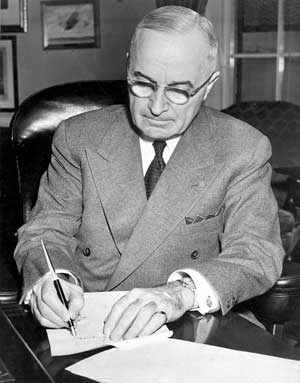 Dec 16: Truman establishes the Office of Defense Mobilization. As promised last night, President Truman signs Presidential Proclamation 2914 which calls for strengthening the country’s defenses and establishes the Office of Defense Mobilization. The new office is empowered with establishing production controls to ensure an uninterrupted supply of goods and material for the military, and to provide economic stabilization through wage and price controls. Among its first actions is to cancel price increases announced by Chrysler, Ford, and General Motors in the past few days.
Dec 16: Truman establishes the Office of Defense Mobilization. As promised last night, President Truman signs Presidential Proclamation 2914 which calls for strengthening the country’s defenses and establishes the Office of Defense Mobilization. The new office is empowered with establishing production controls to ensure an uninterrupted supply of goods and material for the military, and to provide economic stabilization through wage and price controls. Among its first actions is to cancel price increases announced by Chrysler, Ford, and General Motors in the past few days.
![]() Dec 16: Railroad workers end their wildcat strike. Following President Truman’s harsh verbal attack on national radio against the railroad strike last night, more than 10,000 railroad switchmen have ended their three-day wildcat strike. With the promise of rail traffic moving again, the Post Office removes its embargo against shipping packages by rail. Industrial operations, especially steel mills, which have been forced to cut production during the strike, have begun recalling laid-off workers. The workers have been striking in defiance of the Brotherhood of Railroad Trainmen three Federal Court orders, and the U.S. Army, which has been operating the railroads since they were nationalized in August.
Dec 16: Railroad workers end their wildcat strike. Following President Truman’s harsh verbal attack on national radio against the railroad strike last night, more than 10,000 railroad switchmen have ended their three-day wildcat strike. With the promise of rail traffic moving again, the Post Office removes its embargo against shipping packages by rail. Industrial operations, especially steel mills, which have been forced to cut production during the strike, have begun recalling laid-off workers. The workers have been striking in defiance of the Brotherhood of Railroad Trainmen three Federal Court orders, and the U.S. Army, which has been operating the railroads since they were nationalized in August.
▲Sunday, December 17
![]()
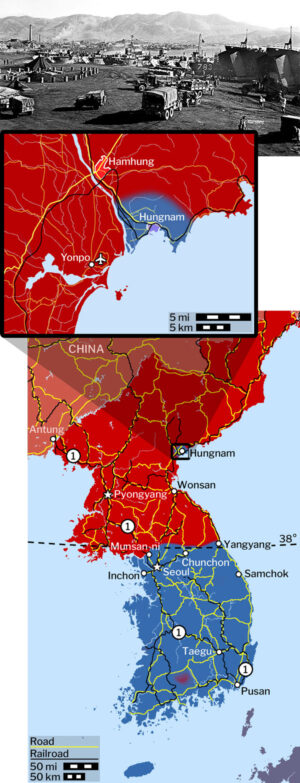 Dec 17: Korean War, Hungnam Evacuation: Yonpo airfield closed, South Koreans leave Hungnam. While it has become apparent that the Chinese are starting to close in on Hungnam, they haven’t arrived in force yet to pose an imminent threat to evacuation operations. The last of the ROK I Corps has departed and is bound for Samchok (Samcheok), where it will be deployed to anchor the eastern end of the defensive line above the 38th Parallel. At the same time, operations are ended at Yonpo airfield and the defenders there will withdraw northeast to the north bank of the Songchon River the next day. Aircraft from Yongpo have airlifted 3,600 troops, 196 vehicles, 1,300 ton of cargo, and several hundred refugees.
Dec 17: Korean War, Hungnam Evacuation: Yonpo airfield closed, South Koreans leave Hungnam. While it has become apparent that the Chinese are starting to close in on Hungnam, they haven’t arrived in force yet to pose an imminent threat to evacuation operations. The last of the ROK I Corps has departed and is bound for Samchok (Samcheok), where it will be deployed to anchor the eastern end of the defensive line above the 38th Parallel. At the same time, operations are ended at Yonpo airfield and the defenders there will withdraw northeast to the north bank of the Songchon River the next day. Aircraft from Yongpo have airlifted 3,600 troops, 196 vehicles, 1,300 ton of cargo, and several hundred refugees.
▲Monday, December 18
![]() Dec 18: NATO countries agree to unified armed force to protect Western Europe. The agreement comes after months of wrangling over the cost of re-arming Western European armed forces and over whether West Germany would be allowed to participate. That has been a particular sticking point which France, which opposes West Germany’s re-arming, and with West Germany itself, which insists that its participation in NATO must be on an equal bases with other NATO members. Since West Germany is not yet a NATO member, the twelve member nations have agreed in principle to allow West Germany to participate, with details to be worked out later. France agrees, reluctantly, mainly because the Korean War and the Communist insurgency in Vietnam serve as stark reminders of what may be in store for a Europe divided by the Iron Curtain. This agreement clears the way for U.S. President Harry Truman to name Gen. Dwight D. Eisenhower as NATO’s first commander-in-chief.
Dec 18: NATO countries agree to unified armed force to protect Western Europe. The agreement comes after months of wrangling over the cost of re-arming Western European armed forces and over whether West Germany would be allowed to participate. That has been a particular sticking point which France, which opposes West Germany’s re-arming, and with West Germany itself, which insists that its participation in NATO must be on an equal bases with other NATO members. Since West Germany is not yet a NATO member, the twelve member nations have agreed in principle to allow West Germany to participate, with details to be worked out later. France agrees, reluctantly, mainly because the Korean War and the Communist insurgency in Vietnam serve as stark reminders of what may be in store for a Europe divided by the Iron Curtain. This agreement clears the way for U.S. President Harry Truman to name Gen. Dwight D. Eisenhower as NATO’s first commander-in-chief.
![]() Dec 18: General Motors orders halt to sales of 1951 models. In response to an Economic Stabilization Agency order to roll back new car prices to 1950 levels, General Motors sends telegrams to 12,000 Chevrolet, Pontiac and Cadillac dealers directing them to stop selling 1951 models. The order is in place while General Motors examines the price freeze order and the possible effect that it would have on wages. GM is also warning unions holding cost-of-living escalator wage agreements that the ESA edict places those agreements in jeopardy. G.M. had already announced price increases for the three divisions. The company says that increased defense spending because of the Korean War has increased demand for steel and rubber, causing prices to rise for those commodities. And increased hiring at defense plants has caused pressure for higher wages. Besides, says G.M., the 1951 cars are “far superior” and cost more to build than the 1950 models. A company spokesman says that 104,400 of the affected 1951 models have been shipped to dealers since December 1. G.M.’s other two divisions, Buick and Oldsmobile, are just starting production for 1951 and won’t be available until January. Chrysler is not affected by the ESA order yet because their 1951 models won’t go on sale until next month. Ford and Nash, who had previously said they would abide by the order, have refused to comment.
Dec 18: General Motors orders halt to sales of 1951 models. In response to an Economic Stabilization Agency order to roll back new car prices to 1950 levels, General Motors sends telegrams to 12,000 Chevrolet, Pontiac and Cadillac dealers directing them to stop selling 1951 models. The order is in place while General Motors examines the price freeze order and the possible effect that it would have on wages. GM is also warning unions holding cost-of-living escalator wage agreements that the ESA edict places those agreements in jeopardy. G.M. had already announced price increases for the three divisions. The company says that increased defense spending because of the Korean War has increased demand for steel and rubber, causing prices to rise for those commodities. And increased hiring at defense plants has caused pressure for higher wages. Besides, says G.M., the 1951 cars are “far superior” and cost more to build than the 1950 models. A company spokesman says that 104,400 of the affected 1951 models have been shipped to dealers since December 1. G.M.’s other two divisions, Buick and Oldsmobile, are just starting production for 1951 and won’t be available until January. Chrysler is not affected by the ESA order yet because their 1951 models won’t go on sale until next month. Ford and Nash, who had previously said they would abide by the order, have refused to comment.
![]() Dec 18: President Truman authorizes the establishment of the Nevada Test Site at Nellis Air Force Gunnery and Bombing Range, for testing nuclear weapons in the U.S. The decision to test nuclear weapons on U.S. soil is still Top Secret and hasn’t been revealed to the public. That will happen in January, just two weeks before the first atomic bomb is detonated at the new site.
Dec 18: President Truman authorizes the establishment of the Nevada Test Site at Nellis Air Force Gunnery and Bombing Range, for testing nuclear weapons in the U.S. The decision to test nuclear weapons on U.S. soil is still Top Secret and hasn’t been revealed to the public. That will happen in January, just two weeks before the first atomic bomb is detonated at the new site.
▲Tuesday, December 19
![]() Dec 19: Eisenhower named Commander in Chief of NATO forces. The North Atlantic Council formally appoints the World War II hero general to lead Western Europe’s common defense against the Soviet Union and its Eastern European allies. The council also establishes a new production board to supervise the economic aspects of Western Europe’s rearmament. This includes, specifically, overseeing the allocation of available raw materials and for ensure a fair distribution among the alliance members. This is a particularly worrisome issue for war-ravaged, cash-strapped Europe, which is already having to contend with price increases for steel, rubber, and other materials due to American’s expanded defense production due to the Korean War. The council also agreed to begin talks with West Germany to explore the possibility of its joining NATO. Under the current Occupation Statute, West Germany is barred from raising an army, navy, or air force. Eisenhower will take up his post on January 1.
Dec 19: Eisenhower named Commander in Chief of NATO forces. The North Atlantic Council formally appoints the World War II hero general to lead Western Europe’s common defense against the Soviet Union and its Eastern European allies. The council also establishes a new production board to supervise the economic aspects of Western Europe’s rearmament. This includes, specifically, overseeing the allocation of available raw materials and for ensure a fair distribution among the alliance members. This is a particularly worrisome issue for war-ravaged, cash-strapped Europe, which is already having to contend with price increases for steel, rubber, and other materials due to American’s expanded defense production due to the Korean War. The council also agreed to begin talks with West Germany to explore the possibility of its joining NATO. Under the current Occupation Statute, West Germany is barred from raising an army, navy, or air force. Eisenhower will take up his post on January 1.
▲Wednesday, December 20
▲Thursday, December 21
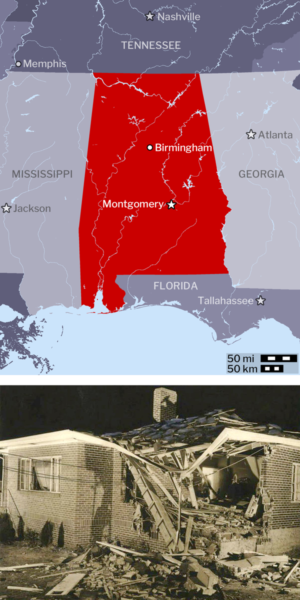 Dec 21: Birmingham home bombed after Appeals Court upholds ban on segregated zoning. For the sixth time in forty months, a home in the North Smithfield neighborhood of Birmingham Alabama has been bombed. The dynamite blast goes off at about 11:35 p.m., partly destroying the brand new, contemporary-style $18,000 (about $190,000 today) home of Mary and Monroe Monk. The home is located at 850 North Center Street, the street that has traditionally been the dividing line for White and Negro residences. The couple’s lawsuit against the city of Birmingham has led to a Federal Court ruling striking down the city’s race-based zoning ordinances that have prevented African-Americans from owning homes in designated white neighborhoods. Just yesterday, the U.S. Fifth Circuit Court of Appeals upheld the lower court ruling. The couple moved into the house on the “white” side of Center Street just two days ago. Six persons, two of them children, narrowly escape serious injury when the bomb explodes on a screened porch just outside the front bedroom. The Monk residence is within two blocks of five other homes that have been bombed since 1947.
Dec 21: Birmingham home bombed after Appeals Court upholds ban on segregated zoning. For the sixth time in forty months, a home in the North Smithfield neighborhood of Birmingham Alabama has been bombed. The dynamite blast goes off at about 11:35 p.m., partly destroying the brand new, contemporary-style $18,000 (about $190,000 today) home of Mary and Monroe Monk. The home is located at 850 North Center Street, the street that has traditionally been the dividing line for White and Negro residences. The couple’s lawsuit against the city of Birmingham has led to a Federal Court ruling striking down the city’s race-based zoning ordinances that have prevented African-Americans from owning homes in designated white neighborhoods. Just yesterday, the U.S. Fifth Circuit Court of Appeals upheld the lower court ruling. The couple moved into the house on the “white” side of Center Street just two days ago. Six persons, two of them children, narrowly escape serious injury when the bomb explodes on a screened porch just outside the front bedroom. The Monk residence is within two blocks of five other homes that have been bombed since 1947.![]() Dec 21: MacArthur imposes press censorship. Gen. Douglas MacArthur orders press censorship on dispatches from Korea and on accounts of U.N. operations written in Tokyo. The official announcement avoids the use of the word “censorship,” which earlier in the war MacArthur said he found “abhorrent.” But the announcement says simply that, effective immediately, all press reports, radio broadcasts, magazine articles and photographs “pertaining to military operations whose origin is in Japan, will be submitted to the press advisory division for clearance before transmission.” A similar system is being imposed inside Korea for dispatches transmitted over Army-controlled facilities. Several U.N. figures, and some veteran correspondents who experienced censorship during World War II, have advocated its imposition in Korea. They argue that the previous voluntary guidelines supplied by military headquarters are too vague, an they place too much responsibility on correspondents to decide for themselves what information is or is not useful to the enemy. With China now entering the war, the stakes are seen as being much greater than before.
Dec 21: MacArthur imposes press censorship. Gen. Douglas MacArthur orders press censorship on dispatches from Korea and on accounts of U.N. operations written in Tokyo. The official announcement avoids the use of the word “censorship,” which earlier in the war MacArthur said he found “abhorrent.” But the announcement says simply that, effective immediately, all press reports, radio broadcasts, magazine articles and photographs “pertaining to military operations whose origin is in Japan, will be submitted to the press advisory division for clearance before transmission.” A similar system is being imposed inside Korea for dispatches transmitted over Army-controlled facilities. Several U.N. figures, and some veteran correspondents who experienced censorship during World War II, have advocated its imposition in Korea. They argue that the previous voluntary guidelines supplied by military headquarters are too vague, an they place too much responsibility on correspondents to decide for themselves what information is or is not useful to the enemy. With China now entering the war, the stakes are seen as being much greater than before.
![]() Dec 21: Railroad unions agree to three-year pact. A twenty-two-month dispute with four railroad unions and representatives of railroad companies is finally resolved following a twenty-five-hour White House negotiating marathon. The three-year contract includes a no-strike clause, pay increases, and the reduction of the standard work-week for rail yard switchmen from forty-eight hours to forty. Truman nationalized the railroads in August to head off a potentially crippling national strike. Since then, the railroads have been operating formally under the auspices of the U.S. Army. The government will continue to oversee railroad operations for the time being, pending the outcome of negotiations with sixteen other unions representing about a million employes. The White House-sponsored negotiations between the railroad companies and the unions took on greater urgency last week when a wildcat strike threatened to bring rail traffic to a halt across the nation.
Dec 21: Railroad unions agree to three-year pact. A twenty-two-month dispute with four railroad unions and representatives of railroad companies is finally resolved following a twenty-five-hour White House negotiating marathon. The three-year contract includes a no-strike clause, pay increases, and the reduction of the standard work-week for rail yard switchmen from forty-eight hours to forty. Truman nationalized the railroads in August to head off a potentially crippling national strike. Since then, the railroads have been operating formally under the auspices of the U.S. Army. The government will continue to oversee railroad operations for the time being, pending the outcome of negotiations with sixteen other unions representing about a million employes. The White House-sponsored negotiations between the railroad companies and the unions took on greater urgency last week when a wildcat strike threatened to bring rail traffic to a halt across the nation.
![]() Dec 21: G.M. complies with price rollback order. General Motors says it is dropping its opposition to an Economic Stabilization Agency order to rescind its price increases on 1951 model passenger cars. G.M. had imposed an embargo on the sale of 1951-model Chevrolet, Pontiac and Cadillac cars on Monday. In addition, G.M. will offer rebates to customers who have purchased 1951 models at the higher prices. The price rollback order affects G.M., Ford, Chrysler, and Nash Motors, all of which had announced price increases for their 1951 cars.
Dec 21: G.M. complies with price rollback order. General Motors says it is dropping its opposition to an Economic Stabilization Agency order to rescind its price increases on 1951 model passenger cars. G.M. had imposed an embargo on the sale of 1951-model Chevrolet, Pontiac and Cadillac cars on Monday. In addition, G.M. will offer rebates to customers who have purchased 1951 models at the higher prices. The price rollback order affects G.M., Ford, Chrysler, and Nash Motors, all of which had announced price increases for their 1951 cars.
▲Friday, December 22
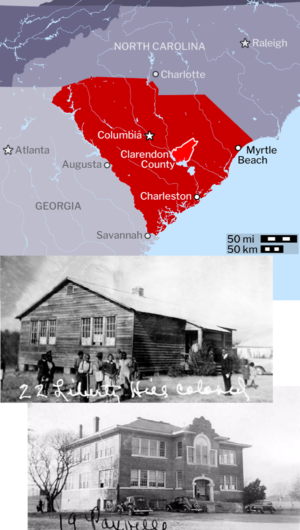 Dec 22: School desegregation lawsuit filed in South Carolina. The NAACP files a federal lawsuit in Clarendon County, South Carolina on behalf of African-American school children against officials of School District 22. The plaintiffs ask that the sections of the state’s 1895 constitution and associated state laws mandating racial segregation be declared unconstitutional. The NAACP had filed an earlier lawsuit that simply took its cue from the June U.S. Supreme Court ruling that declared that separate facilities for Negroes must be equal to those of whites under the “separate but equal” doctrine. Conditions in the school district were far from equal. Black students had to walk as far as sixteen miles (25 km) to and from school each day, and they frequently have to gather wood to fuel the heating stoves. White students enjoyed modern school buildings and the use of 33 buses to get there. Not a single school bus is allocated for black students. The NAACP filed suit asking for enforcement of the “equal” half of the “separate but equal” doctrine. But when the case reached Judge Waties Waring’s courtroom, Waring recommends to NAACP lawyer Thurgood Marshall that he withdraw this case and re-file it as an expanded case from one of equalization to one calling for desegregation. In other words, instead of asking for enforcement of the separate but equal doctrine, the children’s parents would ask for the very system of segregation be held unconstitutional. Because the case directly challenges the enforcement of a state constitutional provision, Federal law requires that a three-judge court be convened to hear the case. Judge Waring will be one of the three judges. This case, Briggs v. Elliott is the first of what will eventually be five cases that will later be combined into the U.S. Supreme Court case of Brown v. Board of Education.
Dec 22: School desegregation lawsuit filed in South Carolina. The NAACP files a federal lawsuit in Clarendon County, South Carolina on behalf of African-American school children against officials of School District 22. The plaintiffs ask that the sections of the state’s 1895 constitution and associated state laws mandating racial segregation be declared unconstitutional. The NAACP had filed an earlier lawsuit that simply took its cue from the June U.S. Supreme Court ruling that declared that separate facilities for Negroes must be equal to those of whites under the “separate but equal” doctrine. Conditions in the school district were far from equal. Black students had to walk as far as sixteen miles (25 km) to and from school each day, and they frequently have to gather wood to fuel the heating stoves. White students enjoyed modern school buildings and the use of 33 buses to get there. Not a single school bus is allocated for black students. The NAACP filed suit asking for enforcement of the “equal” half of the “separate but equal” doctrine. But when the case reached Judge Waties Waring’s courtroom, Waring recommends to NAACP lawyer Thurgood Marshall that he withdraw this case and re-file it as an expanded case from one of equalization to one calling for desegregation. In other words, instead of asking for enforcement of the separate but equal doctrine, the children’s parents would ask for the very system of segregation be held unconstitutional. Because the case directly challenges the enforcement of a state constitutional provision, Federal law requires that a three-judge court be convened to hear the case. Judge Waring will be one of the three judges. This case, Briggs v. Elliott is the first of what will eventually be five cases that will later be combined into the U.S. Supreme Court case of Brown v. Board of Education.▲Saturday, December 23
![]()
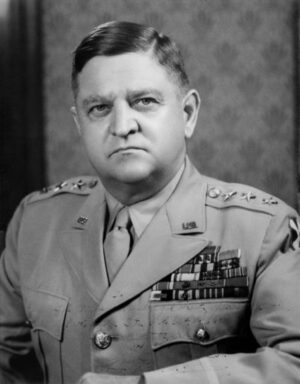 Dec 23: Gen. Walker killed in jeep crash north of Seoul. Lt. Gen. Walton H. Walker, commander of the U.S. Eighth Army in Korea, is killed when his jeep crashes into a truck north of Seoul. Walker has been tasked with leading the U.N. forces in Korea since the earliest days of the war. Through August and September, he successfully defended the Pusan (Busan) Perimeter against repeated North Korean attacks aimed at driving U.S. and South Korean forces into the sea. After the landing at Inchon opened a second front, Walker’s forces swept northward. When it came time to cross the 38th Parallel, U.N. forces were split in two, a step made necessary by the steep mountainous territory in North Korea that effectively split the peninsula down the middle. Walker commanded the Eight Army on the west coast, and X Corps, commanded by Marine Corps Gen. Edward Almond, was assigned northeast. Walker will be posthumously promoted to full general and buried in Arlington National Cemetery. Walton’s deputy, Lt. Gen. Matthew Ridgway, is quickly named to take the Eight Army command.
Dec 23: Gen. Walker killed in jeep crash north of Seoul. Lt. Gen. Walton H. Walker, commander of the U.S. Eighth Army in Korea, is killed when his jeep crashes into a truck north of Seoul. Walker has been tasked with leading the U.N. forces in Korea since the earliest days of the war. Through August and September, he successfully defended the Pusan (Busan) Perimeter against repeated North Korean attacks aimed at driving U.S. and South Korean forces into the sea. After the landing at Inchon opened a second front, Walker’s forces swept northward. When it came time to cross the 38th Parallel, U.N. forces were split in two, a step made necessary by the steep mountainous territory in North Korea that effectively split the peninsula down the middle. Walker commanded the Eight Army on the west coast, and X Corps, commanded by Marine Corps Gen. Edward Almond, was assigned northeast. Walker will be posthumously promoted to full general and buried in Arlington National Cemetery. Walton’s deputy, Lt. Gen. Matthew Ridgway, is quickly named to take the Eight Army command.
![]() Dec 23: Korean War: Army penalizes two reporters. The U.S. Eighth Army confines two reporters to quarters overnight for allegedly disclosing prematurely Gen. Walker’s death. United Press reporter Peter Webb and NBC’s Kenneth Kantor are restricted to the press billet and denied use of the Eighth Army’s communications facilities on the orders of public information officer Lt. Col. Robert Thompson. The restrictions will be lifted the following morning “at least until the investigation of the Walker story is completed.” Both news organizations deny that any violations of security or censorship rules have taken place. Both organizations say they did not report on Walker’s death until after the information was released by Army censors in Tokyo.
Dec 23: Korean War: Army penalizes two reporters. The U.S. Eighth Army confines two reporters to quarters overnight for allegedly disclosing prematurely Gen. Walker’s death. United Press reporter Peter Webb and NBC’s Kenneth Kantor are restricted to the press billet and denied use of the Eighth Army’s communications facilities on the orders of public information officer Lt. Col. Robert Thompson. The restrictions will be lifted the following morning “at least until the investigation of the Walker story is completed.” Both news organizations deny that any violations of security or censorship rules have taken place. Both organizations say they did not report on Walker’s death until after the information was released by Army censors in Tokyo.
![]()
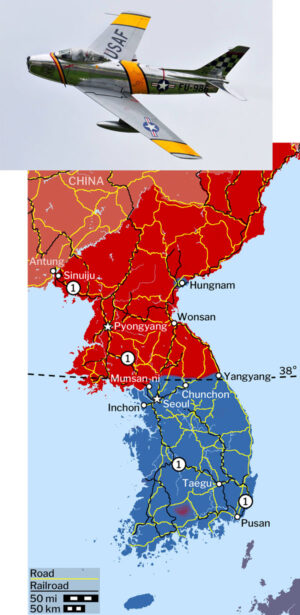 Dec 23: Korean War: U.S. Sabre jets down six MiGs near Manchurian border.. The F-86 Sabres, fastest American fighter planes in regular service, fight the biggest air battle of the Korean War so far. The six Sabres take on an enemy force of between fifteen to twenty-five planes about twenty miles (36 km) southeast of Sinuiju near the mouth of the Yalu River. In the ensuing dogfight, six Russian-built MiG-15s are shot down in flames and a seventh is damaged but makes it back across the border to China. The MiG-15 is the first successful jet fighter to incorporate a swept wing design that allows it to achieve speeds at almost the speed of sound. It had easily out-classed straight-winged American jet fighters until the F-86, America’s own swept-wing answer, arrived in Korea earlier this month.
Dec 23: Korean War: U.S. Sabre jets down six MiGs near Manchurian border.. The F-86 Sabres, fastest American fighter planes in regular service, fight the biggest air battle of the Korean War so far. The six Sabres take on an enemy force of between fifteen to twenty-five planes about twenty miles (36 km) southeast of Sinuiju near the mouth of the Yalu River. In the ensuing dogfight, six Russian-built MiG-15s are shot down in flames and a seventh is damaged but makes it back across the border to China. The MiG-15 is the first successful jet fighter to incorporate a swept wing design that allows it to achieve speeds at almost the speed of sound. It had easily out-classed straight-winged American jet fighters until the F-86, America’s own swept-wing answer, arrived in Korea earlier this month.
![]()
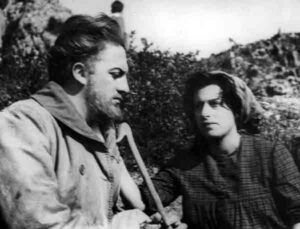 Dec 23: New York City bans film as “blasphemous.” Roberto Rossellini’s film The Miracle, starring Anna Magnani and Federico Fellini, is part of a three-part anthology film The Ways of Love with two other short films: Jean Renoir’s A Day in the Country (1936) and Marcel Pagnol’s Jofroi (1933). Released in the U.S. in 1950, the anthology is being shown at the Paris Theatre at 4 W. 58th Street in New York City. The Miracle tells the story of a naive and obsessively religious woman who mistakes a handsome bearded traveler to be St. Joseph. He gets her drunk and she passes out. When she wakes up, he’s gone and she concludes his appearance was a miracle. When she discovers she is pregnant, she takes it as another miracle. Ridiculed by the townspeople, she leaves home. In the final scene, she is in an isolated mountaintop church. A baby cries and she is seen opening her dress, Madonna-like, to feed her child. The National Legion of Decency denounces the film as anti-Catholic and sacrilegious. Edward T. McCaffrey, New York Commissioner of Licenses, sends a letter to the theater finding the film “officially and personally blasphemous. … Officially, as a representative of the city government, I felt there were hundreds of thousands of citizens whose religious beliefs were assailed by the picture.” McCaffry sent two letters demanding the picture be withdrawn. In the second letter yesterday, McCaffrey says that because the picture was shown again Friday night following the first letter, he is placing the theater’s license under suspension. He warns other city theaters that they face the same fate if they try to screen The Miracle.
Dec 23: New York City bans film as “blasphemous.” Roberto Rossellini’s film The Miracle, starring Anna Magnani and Federico Fellini, is part of a three-part anthology film The Ways of Love with two other short films: Jean Renoir’s A Day in the Country (1936) and Marcel Pagnol’s Jofroi (1933). Released in the U.S. in 1950, the anthology is being shown at the Paris Theatre at 4 W. 58th Street in New York City. The Miracle tells the story of a naive and obsessively religious woman who mistakes a handsome bearded traveler to be St. Joseph. He gets her drunk and she passes out. When she wakes up, he’s gone and she concludes his appearance was a miracle. When she discovers she is pregnant, she takes it as another miracle. Ridiculed by the townspeople, she leaves home. In the final scene, she is in an isolated mountaintop church. A baby cries and she is seen opening her dress, Madonna-like, to feed her child. The National Legion of Decency denounces the film as anti-Catholic and sacrilegious. Edward T. McCaffrey, New York Commissioner of Licenses, sends a letter to the theater finding the film “officially and personally blasphemous. … Officially, as a representative of the city government, I felt there were hundreds of thousands of citizens whose religious beliefs were assailed by the picture.” McCaffry sent two letters demanding the picture be withdrawn. In the second letter yesterday, McCaffrey says that because the picture was shown again Friday night following the first letter, he is placing the theater’s license under suspension. He warns other city theaters that they face the same fate if they try to screen The Miracle.
▲Sunday, December 24
Christmas Eve
![]()
 Dec 24: Korean War: Hamhung evacuation is completed. The defense perimeter around Hamhung is silent as the last U.S. 3rd Division, the last Division at Hamhung, loads out. A battalion from each regiment remains on shore as a rear guard while Navy underwater demolition teams and an engineer combat battalion prepares the port facilities for destruction. The last corps supplies, the port operating units, and as many of the remaining refugees as possible are put aboard ships. About 14,000 refugees are placed aboard the merchant marine cargo ship, the SS Meredith Victory, in the largest refugee evacuation from land by a single ship. Over the past two weeks, 105,000 troops, 17,500 vehicles, and 350,000 tons of equipment, ammunition and supplies, and more than 86,000 refugees have been evacuated. About the same number of refugees, however, are left behind for lack of room on the ships. Also left behind are 200 tons of ammunition, 200 tons of frozen dynamite, 500 thousand-pounds aerial bombs, and 200 drums of oil and gasoline. An X Corps report says that “all of this added to the loudness of the final blowup of the port of Hungnam.” That final blowup is preceded at about 2:30 p.m. by a massive bombardment by the Navy, which put down a terrific barrage as far as a mile and a half (2½ km) inland while the last platoons leave the beaches. Shortly after the entire port is demolished in a massive detonation.
Dec 24: Korean War: Hamhung evacuation is completed. The defense perimeter around Hamhung is silent as the last U.S. 3rd Division, the last Division at Hamhung, loads out. A battalion from each regiment remains on shore as a rear guard while Navy underwater demolition teams and an engineer combat battalion prepares the port facilities for destruction. The last corps supplies, the port operating units, and as many of the remaining refugees as possible are put aboard ships. About 14,000 refugees are placed aboard the merchant marine cargo ship, the SS Meredith Victory, in the largest refugee evacuation from land by a single ship. Over the past two weeks, 105,000 troops, 17,500 vehicles, and 350,000 tons of equipment, ammunition and supplies, and more than 86,000 refugees have been evacuated. About the same number of refugees, however, are left behind for lack of room on the ships. Also left behind are 200 tons of ammunition, 200 tons of frozen dynamite, 500 thousand-pounds aerial bombs, and 200 drums of oil and gasoline. An X Corps report says that “all of this added to the loudness of the final blowup of the port of Hungnam.” That final blowup is preceded at about 2:30 p.m. by a massive bombardment by the Navy, which put down a terrific barrage as far as a mile and a half (2½ km) inland while the last platoons leave the beaches. Shortly after the entire port is demolished in a massive detonation.
![]() Dec 24: Korean War: South Korean government votes to evacuate Seoul. The Republic of Korea’s National Assembly votes “with reluctance” to heed the advice of U.N. Command and evacuate Seoul. It decides to reconvene in Pusan (Busan) next month. A government proclamation advices nonessential civilians to leave the city, taking with them as much food and clothing as they can carry. President Syngman Rhee and his Cabinet say they will remain in Seoul, with planes standing by to move them to an undisclosed location when the time comes. Reporters estimate that more than half of Seoul’s population has already left, and that business is nearly at a standstill in the main shopping area. Reconnaissance forces say they have noted a Chinese building just south of the 38th Parallel north of Seoul, which they believe indicates that a major offensive will be launched “in the near future.”
Dec 24: Korean War: South Korean government votes to evacuate Seoul. The Republic of Korea’s National Assembly votes “with reluctance” to heed the advice of U.N. Command and evacuate Seoul. It decides to reconvene in Pusan (Busan) next month. A government proclamation advices nonessential civilians to leave the city, taking with them as much food and clothing as they can carry. President Syngman Rhee and his Cabinet say they will remain in Seoul, with planes standing by to move them to an undisclosed location when the time comes. Reporters estimate that more than half of Seoul’s population has already left, and that business is nearly at a standstill in the main shopping area. Reconnaissance forces say they have noted a Chinese building just south of the 38th Parallel north of Seoul, which they believe indicates that a major offensive will be launched “in the near future.”
▲Monday, December 25
Christmas
![]()
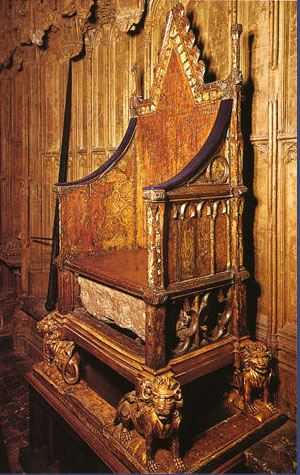 Dec 25: Scottish coronation stone stolen from Westminster Abbey. The theft of the 336-pound (152 kg) Stone of Scone is discovered on Christmas day. It was apparently stolen sometime after the last Christmas Eve service celebrated yesterday afternoon. For four hundred years, the stone had been used in the coronation ceremonies of Scottish Kings, until 1296, when it was taken by Edward I as spoils of war and moved to Westminster Abbey. It was fitted into a wooden chair, known as King Edward’s Chair, on which most English, and then British, sovereigns have been crowned. Police launch a nationwide manhunt for the stone’s recovery, and suspect Scottish Nationalists are behind the theft.
Dec 25: Scottish coronation stone stolen from Westminster Abbey. The theft of the 336-pound (152 kg) Stone of Scone is discovered on Christmas day. It was apparently stolen sometime after the last Christmas Eve service celebrated yesterday afternoon. For four hundred years, the stone had been used in the coronation ceremonies of Scottish Kings, until 1296, when it was taken by Edward I as spoils of war and moved to Westminster Abbey. It was fitted into a wooden chair, known as King Edward’s Chair, on which most English, and then British, sovereigns have been crowned. Police launch a nationwide manhunt for the stone’s recovery, and suspect Scottish Nationalists are behind the theft.
▲Tuesday, December 26
Boxing Day (Australia, New Zealand, UK)
St. Stephen’s Day (Ireland)
▲Wednesday, December 27
![]() Dec 27: Restrictions on critical materials for defense production force auto industry cutbacks. The Plymouth Division of Chrysler says that it may be forced to delay the introduction of its 1951 lines scheduled for January 13. Government-imposed restrictions on steel, copper, aluminum and chrome are to blame, with those materials being allocated to defense industries. At least 25,000 cars need to be in dealer showrooms throughout the country before the 1951 line can be publicly announced. The outlook for producing that many cars is not good, says R.C. Somerville, Plymouth’s general sales manager. “Allocation of materials will govern production,” he says. He says that the entire backlog of 200,000 orders for 1950 Plymouths has been cancelled, and sales going forward will be based on orders for 1951 models. Studebaker also says that it will be affected by the material restrictions, forcing it to reduce car and truck production by 20%. It will also lay off 20% of its workforce, although many of them will be picked up for Studebaker’s military truck production.
Dec 27: Restrictions on critical materials for defense production force auto industry cutbacks. The Plymouth Division of Chrysler says that it may be forced to delay the introduction of its 1951 lines scheduled for January 13. Government-imposed restrictions on steel, copper, aluminum and chrome are to blame, with those materials being allocated to defense industries. At least 25,000 cars need to be in dealer showrooms throughout the country before the 1951 line can be publicly announced. The outlook for producing that many cars is not good, says R.C. Somerville, Plymouth’s general sales manager. “Allocation of materials will govern production,” he says. He says that the entire backlog of 200,000 orders for 1950 Plymouths has been cancelled, and sales going forward will be based on orders for 1951 models. Studebaker also says that it will be affected by the material restrictions, forcing it to reduce car and truck production by 20%. It will also lay off 20% of its workforce, although many of them will be picked up for Studebaker’s military truck production.
▲Thursday, December 28
![]()
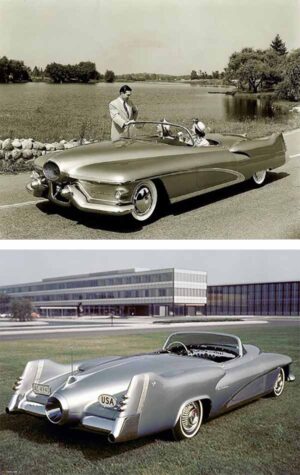 Dec 28: General Motors shows off Le Sabre concept. The brainchild of Harley J. Earl, vice president in charge of styling, the Le Sabre is a convertible with the low swooping lines of a jet fighter. It begins with the high central oval grille in the front, long and wide wing-like front fenders, another set of air intakes at the rear fender, the bold high tail fins and the central “rocket exhaust” tail lights. All of it is set off with the massive wrap-around cockpit-like windshield and dashboard. That central oval grille in front isn’t a real grille. The actual air intake sits below it. The oval “grille” conceals the center headlights. When the driver flips the switch, the oval moves inward, flips around to put the headlights out front, and pushes outward again with the lights on. The aircraft theme continues in the interior, including the twin bucket seats, three separate chrome-trimmed gauge clusters, and a floor-mounted console. \The engine, a supercharged 215 cubic inch (3.5 L) high-compression V-8, burns either gasoline or alcohol, or both. It delivers 335 horsepower, which was massive for its time from such a small power plant. All of the electrical components are driven by a twelve-volt system at a time when six volts is standard for American cars. It has cruise control, a digital speedometer, seat warmers, and built-in hydraulic jacks at the four corners of the car for when you need to change the tire — a routine task in the days of inner tubes. When it isn’t on display at a car show, the Le Sabre serves as Earl’s personal car. He likes to leave the top down when he parks it, especially when it looks like it might rain. The car always draws a crowd, which is always astonished when the car suddenly raises its top and windows whenever a few raindrops hit a special moisture detector on the console. The car represents Earl’s no-holds-barred design vision about what the future of all automotive design would be, and General Motors, according to that vision, would lead the way for the entire industry.
Dec 28: General Motors shows off Le Sabre concept. The brainchild of Harley J. Earl, vice president in charge of styling, the Le Sabre is a convertible with the low swooping lines of a jet fighter. It begins with the high central oval grille in the front, long and wide wing-like front fenders, another set of air intakes at the rear fender, the bold high tail fins and the central “rocket exhaust” tail lights. All of it is set off with the massive wrap-around cockpit-like windshield and dashboard. That central oval grille in front isn’t a real grille. The actual air intake sits below it. The oval “grille” conceals the center headlights. When the driver flips the switch, the oval moves inward, flips around to put the headlights out front, and pushes outward again with the lights on. The aircraft theme continues in the interior, including the twin bucket seats, three separate chrome-trimmed gauge clusters, and a floor-mounted console. \The engine, a supercharged 215 cubic inch (3.5 L) high-compression V-8, burns either gasoline or alcohol, or both. It delivers 335 horsepower, which was massive for its time from such a small power plant. All of the electrical components are driven by a twelve-volt system at a time when six volts is standard for American cars. It has cruise control, a digital speedometer, seat warmers, and built-in hydraulic jacks at the four corners of the car for when you need to change the tire — a routine task in the days of inner tubes. When it isn’t on display at a car show, the Le Sabre serves as Earl’s personal car. He likes to leave the top down when he parks it, especially when it looks like it might rain. The car always draws a crowd, which is always astonished when the car suddenly raises its top and windows whenever a few raindrops hit a special moisture detector on the console. The car represents Earl’s no-holds-barred design vision about what the future of all automotive design would be, and General Motors, according to that vision, would lead the way for the entire industry.
▲Friday, December 29
![]()
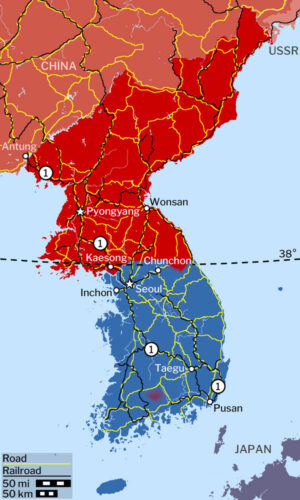 Dec 29: MacArthur says 19 enemy divisions poised to strike. Gen. Douglas MacArthur warns that Chinese Communists are massing six army corps with a total of nineteen divisions, which will be in position to launch a massive attack against U.N. forces in Korea sometime before January 1. They are troops of Gen. Lin Piao’s Fourth Field Army, which first arrived in Korea in October and are now holding a general line from Kaesong to an area north of Chunchon (Chuncheon). Eight more Chinese and North Korean divisions are arrayed from Chunchon to the east coast. The Third Field Army is in reserve near the Manchurian border. Altogether, according to MacArthur’s headquarters, more than half of all of China’s armed strength is either in Korea or ready to march across the border. In Seoul, civilians are abandoning the city at an estimated rate of 80,000 a day. Seoul’s pre-war population was about 1.5 million, but only about a million either remained or had returned there earlier this month. It is now estimated that about 600,000 residents from Seoul are fleeing south, mostly on foot over snow-covered mountains. One U.N. official calls it the worst mass exodus in modern history.
Dec 29: MacArthur says 19 enemy divisions poised to strike. Gen. Douglas MacArthur warns that Chinese Communists are massing six army corps with a total of nineteen divisions, which will be in position to launch a massive attack against U.N. forces in Korea sometime before January 1. They are troops of Gen. Lin Piao’s Fourth Field Army, which first arrived in Korea in October and are now holding a general line from Kaesong to an area north of Chunchon (Chuncheon). Eight more Chinese and North Korean divisions are arrayed from Chunchon to the east coast. The Third Field Army is in reserve near the Manchurian border. Altogether, according to MacArthur’s headquarters, more than half of all of China’s armed strength is either in Korea or ready to march across the border. In Seoul, civilians are abandoning the city at an estimated rate of 80,000 a day. Seoul’s pre-war population was about 1.5 million, but only about a million either remained or had returned there earlier this month. It is now estimated that about 600,000 residents from Seoul are fleeing south, mostly on foot over snow-covered mountains. One U.N. official calls it the worst mass exodus in modern history.
![]()
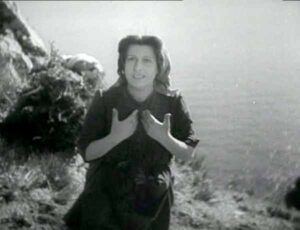 Dec 29: Ban on “blasphemous” film dropped. The ban on exhibiting the Italian film The Miracle in New York City is lifted by License Commissioner Edward T. McCaffrey after he learns that Supreme Court Justice Henry Clay Greenberg is poised to sign a temporary injunction allowing its screening. The film was banned last Saturday after McCaffrey asserted that he found the film “personally and officially” to be “blasphemous” and threatened to revoke the theater’s license unless the film was dropped. In today’s hearing, the film’s distributor noted that the film had been approved by U.S Customs, Motion Picture Division of the state Department of Education (which acts as the official film censor for the state), and had been shown at the Venice Film Festival “without objection from Vatican representatives.” Justice Greenberg says he is prepared to sign the temporary injunction sought by the film’s distributor. But before he does so, he grants a five minute recess so the attorney representing the License Commissioner’s office can consult with McCaffrey by phone. The lawyer returns to the courtroom and announces, The Commissioner does not want to give the of being tyrannical, if that is your honor’s impression, and he is perfectly willing to permit showing of the film until the matter is adjudicated.” Justice Greenberg then signed a show-cause action sought by the film’s distributor and scheduled a hearing for Wednesday. The Miracle is brought back for the 6:00 p.m. showing at the Paris Theatre, 4 W 58th Street. McCaffrey’s ban has brought protests from Mayor Vincent Impellitteri, the ACLU and the New York Film Critics. The National Legion of Decency, a Catholic lay group, has condemned the film as “a sacrilegious and blasphemous mockery of Christian religious truth.” The next day, Msgr. Walter P. Kellenberg, chancellor of the New York Archdiocese, will denounce The Miracle as “an open insult to the faith of millions of people in this city and hundreds of millions throughout the world.”
Dec 29: Ban on “blasphemous” film dropped. The ban on exhibiting the Italian film The Miracle in New York City is lifted by License Commissioner Edward T. McCaffrey after he learns that Supreme Court Justice Henry Clay Greenberg is poised to sign a temporary injunction allowing its screening. The film was banned last Saturday after McCaffrey asserted that he found the film “personally and officially” to be “blasphemous” and threatened to revoke the theater’s license unless the film was dropped. In today’s hearing, the film’s distributor noted that the film had been approved by U.S Customs, Motion Picture Division of the state Department of Education (which acts as the official film censor for the state), and had been shown at the Venice Film Festival “without objection from Vatican representatives.” Justice Greenberg says he is prepared to sign the temporary injunction sought by the film’s distributor. But before he does so, he grants a five minute recess so the attorney representing the License Commissioner’s office can consult with McCaffrey by phone. The lawyer returns to the courtroom and announces, The Commissioner does not want to give the of being tyrannical, if that is your honor’s impression, and he is perfectly willing to permit showing of the film until the matter is adjudicated.” Justice Greenberg then signed a show-cause action sought by the film’s distributor and scheduled a hearing for Wednesday. The Miracle is brought back for the 6:00 p.m. showing at the Paris Theatre, 4 W 58th Street. McCaffrey’s ban has brought protests from Mayor Vincent Impellitteri, the ACLU and the New York Film Critics. The National Legion of Decency, a Catholic lay group, has condemned the film as “a sacrilegious and blasphemous mockery of Christian religious truth.” The next day, Msgr. Walter P. Kellenberg, chancellor of the New York Archdiocese, will denounce The Miracle as “an open insult to the faith of millions of people in this city and hundreds of millions throughout the world.”
▲Saturday, December 30
▲Sunday, December 31
New Year’s Eve
![]() Dec 31: The Chinese Army launches its Third Phase Offensive with an attack on Seoul and other positions south of the 38th Parallel.
Dec 31: The Chinese Army launches its Third Phase Offensive with an attack on Seoul and other positions south of the 38th Parallel.
![[Emphasis Mine]](http://jimburroway.com/wp-content/uploads/2018/01/Gay_Rights_demonstration_NYC_1976.jpg)
